
Coming Soon

Coming Soon
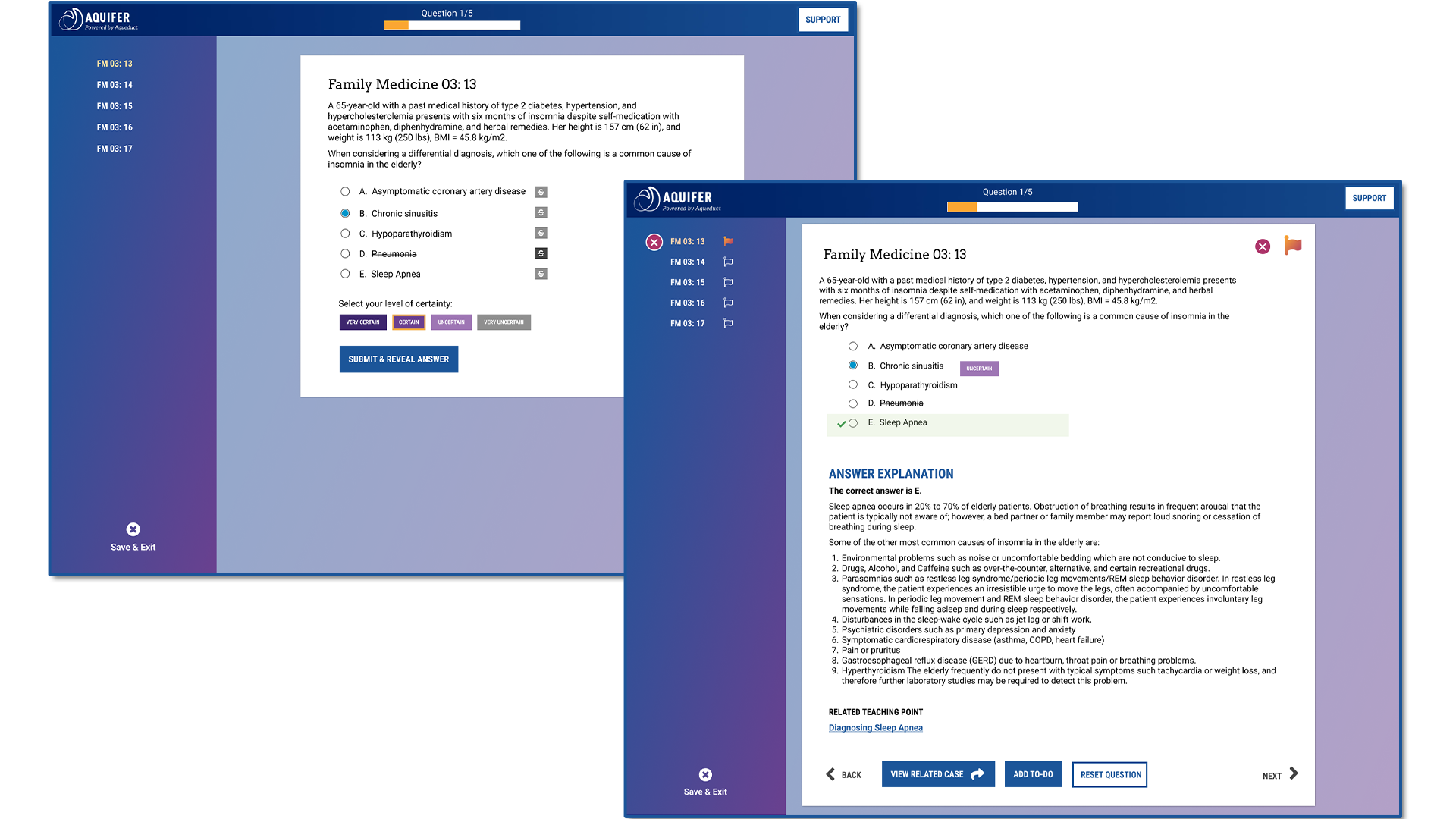
Coming Soon
1. When you type in an incorrect password, you will be notified of how many login attempts you have until your account will lock.
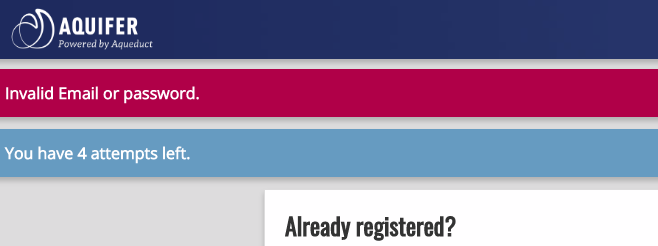
2. After 5 failed attempts, you will be notified that your account is locked.

3. You will receive an email with instructions to unlock your account. Please click on the link “Unlock my account”, to unlock your account.
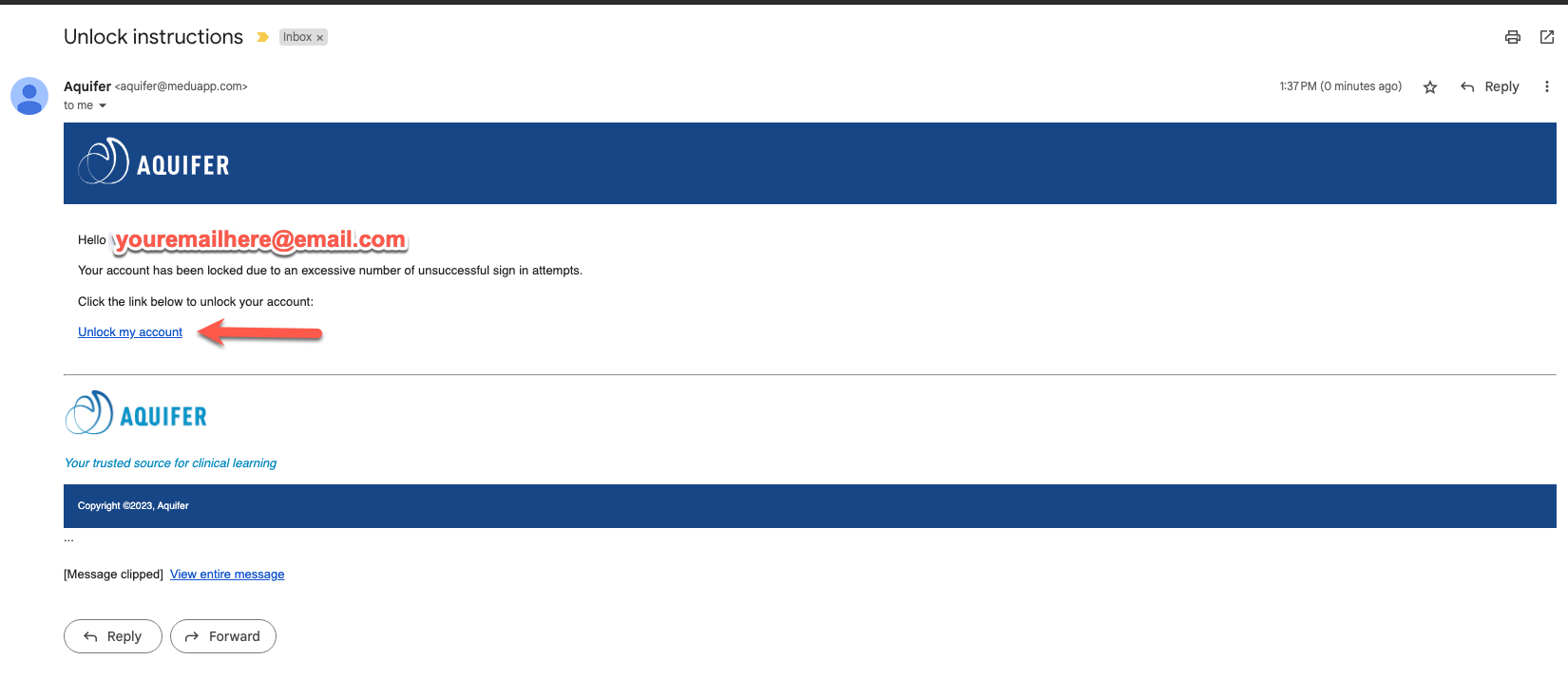
Aquifer has updated our password policy to comply with industry standards and to better protect student data.
Current Password Policy –
Passwords must be at least 12 characters long ✅
Passwords must contain at least one uppercase alpha character (A-Z) ✅
Passwords must contain at least one lowercase alpha character (a-z) ✅
Passwords must contain at least one number. ✅
Passwords may not contain part of the username, first name, last name ✅
Passwords must be changed at least every 180 days ✅
Users may not reuse passwords ✅
Accounts are locked after 5 failed login attempts ✅
Please contact Aquifer Support if you have any questions. A ticket can be submitted using the following form HERE.
Calibrate provides reports that give you what you need to create efficient study plans, track your progress, target learning before an end-of-course exam, and have productive conversations with your faculty to guide your learning.
Once you complete the assessment, you are immediately taken to your results for that assessment. You will also receive an email stating you have completed the exam, and it will include a link to your dashboard so you can review your results. At any time, you may return to your Calibrate Dashboard to access past results and review future assessments that have been set for you.
To access your Calibrate reports from the home screen , click on “Assessment” from the left-hand side menu, or alternatively, click the “View Assessments” card.
This will display the Calibrate dashboard. Every assessment assigned to you will be listed in the dashboard.
If you have not taken your assessment, you will see the words “Not Available” listed under “Reports.”
Reports are available for completed assessments. From the “Reports” dropdown menu, you can select either your Individual Progress Report or your Personal Performance Report.
Once you open your results, you will start at the Results Overview tab.
This tab breaks down your accuracy, certainty, and efficiency compared to peers from healthcare programs who took the exam at a similar time in their rotation.
The next tab calibrates your knowledge and certainty to help you identify where your knowledge and certainty were aligned – or misaligned.
This tab aims to help you calibrate your knowledge and how confident you are in that knowledge.
Each item is detailed to help you determine what you know, how confident you are in that knowledge, and whether your confidence and knowledge align.
Clicking the detail drop-down will show you the Question/Learning Objective, an answer/explanation of the teaching point, the clinical focus and system, and which case to reference for the whole learning point. You can also add notes and the case to your To-Do list as you build your learning plan.
This tab filters and identifies patterns in your learning calibration. This allows you to identify strengths and opportunities for growth or improvement.
This tab filters and identifies patterns in your learning calibration. This allows you to identify strengths and opportunities for growth or improvement.
Below the chart, you can filter the data to find gaps in your knowledge. You can sort by the following:
The final tab is your Learning Plan and To-Do list. It lists any cases you have added and an area to take notes. The learning plan has multiple sections.
The first section shows your notes and to-do list. You can sort, review, and track your progress through Aquifer cases and Integrated Illness Scripts.
The next section of the tab allows you to write your learning plan. You can list the main insights you have learned from taking the assessment. You can ask yourself what your next steps will be to help you progress in the areas in which you struggled and how you will keep on track.
Section three allows you to record any other thoughts or questions you want to remember for your plan or to discuss with a coach, instructor, or peer. Section 4 gives you the ability to share your learning plan. You can share with a coach or anyone who can help you refine and implement your plan.
Your reports show your accuracy, certainty, and efficiency compared to all other students taking the same assessment – not your institutional cohort. Your Calibrate reports links to Aquifer answer explanations and cases you can include in your learning plan.
Actual patients don’t come with tidy answers, and neither do Calibrate reports. Rather than providing question stems and answers, Calibrate encourages you to look for patterns in your results and to take action.
Calibrate is a different kind of assessment. There are no scores–because Calibrate assessments are not designed for grading.
Aquifer formative assessments are designed for your learning, helping you build higher-order thinking and problem-solving skills and providing a standard tool and objective data to align students and faculty.
Once your program assigns an assessment, you have two access options. You will receive an email that will take you directly to your assessment dashboard. You may also log in to the Aquifer learning platform and then click on “Assessment” from the left-hand side menu, or alternatively, click the “View Assessments” card. There will be a notification with the number of Assessments you have been assigned on the left-hand menu.
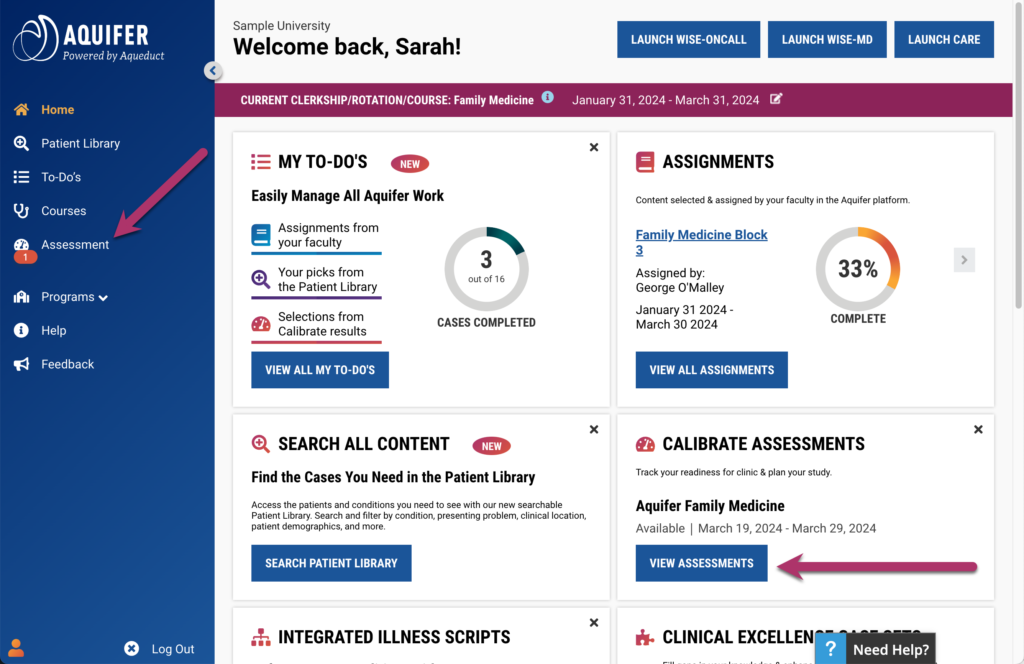
Your Calibrate assessment only becomes available in your dashboard on the day and time your program assigns. Once open, you can click “Begin assessment,” your assessment will begin, and your timer will start. Questions are multiple-choice, board-style vignettes with a certainty rating for each question, allowing you to calibrate your knowledge and certainty.

The assessment screen breaks down as follows:
Make sure you have allotted enough time to take the assessment without interruption. Once you start your assessment, you will have one opportunity to pause it. You will see the Pause Assessment popup when you click the button to pause it. You are required to enter a reason for pausing. The pause will last for 10 minutes.
NOTE: The system will automatically submit your incomplete assessment if you do not resume within 10 minutes.
Be sure to click this to submit your exam. After you submit your assessment, you will return to the dashboard. You have immediate access to your results.
Learn more about understanding your results.
All of these are free, and function well with Aqueduct.

Aquifer congratulates Tracy Fulton, PhD, and Valerie Lang, MD, MHPE, on being named recipients of the prestigious 2021 Alpha Omega Alpha Robert J. Glaser Distinguished Teacher Award from the Association of American Medical Colleges (AAMC). This award, established in 1988 by the Alpha Omega Alpha medical honor society, is given to faculty members who have distinguished themselves in medical student education. Both of these talented educators are members of the Aquifer Educators Consortium, and their dedication to teaching the next generation of medical professionals is remarkable.
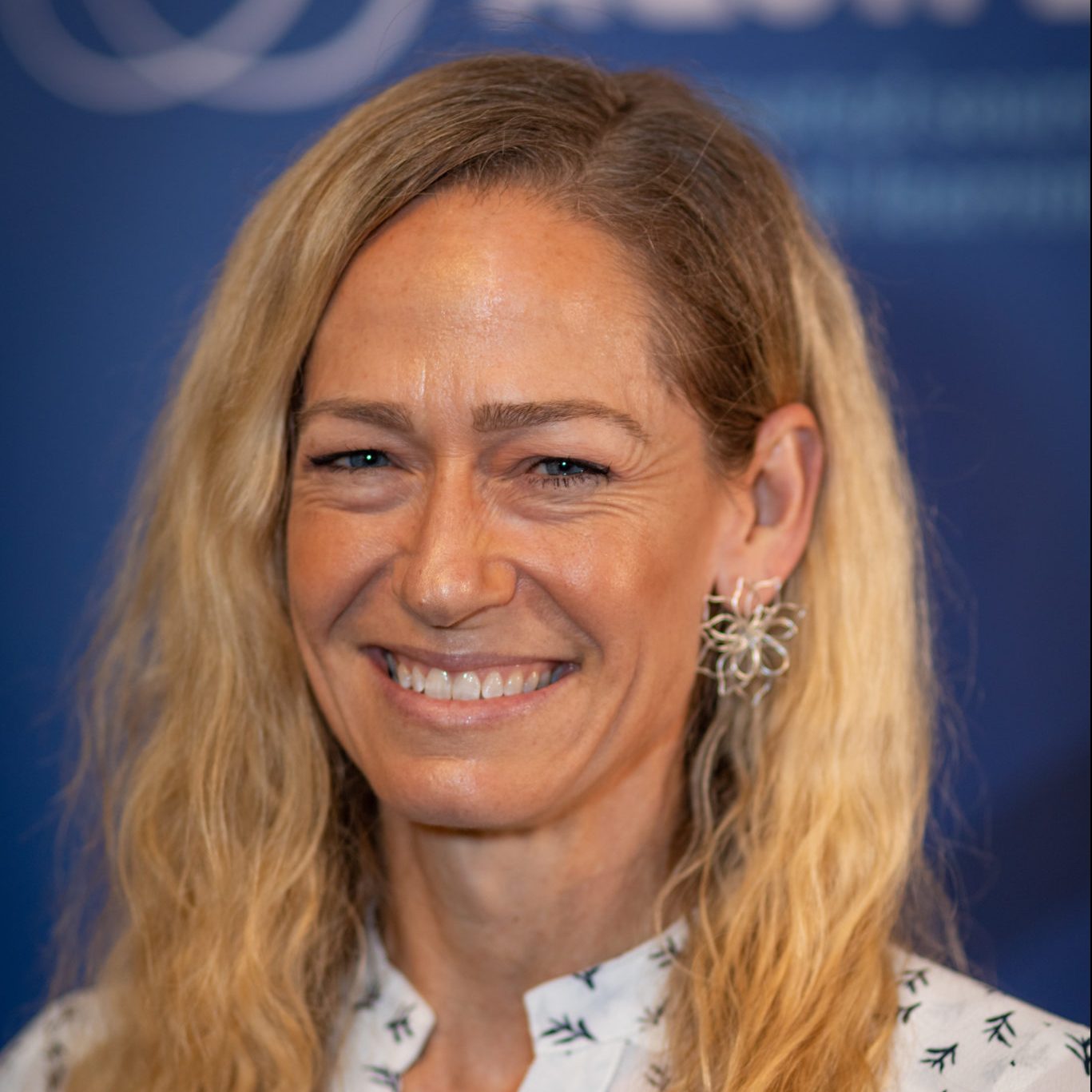
Dr. Tracy Fulton, Sciences Lead for Aquifer Sciences, is a professor of Biochemistry and Biophysics at the University of California, San Francisco, where she is also the Professional School Director for Biochemistry. She has been awarded this recognition for her work implementing and studying the Pathways of Human Metabolism map, a visual tool for health professions students that promotes deep learning and application of classroom concepts to clinical problems.
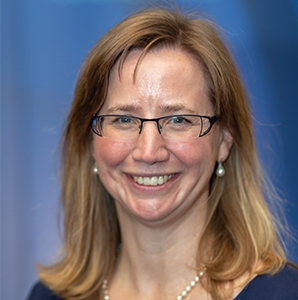
Dr. Valerie Lang, Academic Director of the Aquifer Clinical Decision Making Exam, has been named a recipient of this award for her work in curriculum development and teaching acumen. An Associate Professor at the University of Rochester School of Medicine and Dentistry, Dr. Lang is the Director of Meliora in Medicine, as well as the Director of Faculty Development, Hospital Medicine Division, and the Senior Associate Division Chief, Hospital Medicine.
Aquifer is a thriving, collaborative community of healthcare education leaders deeply committed to driving innovation in teaching and learning. The Aquifer Educators Consortium brings together more than 70 healthcare educators across disciplines to collaborate, innovate, and make advances in health professions education. For educators and healthcare providers, participation in the Consortium offers a unique cross-disciplinary peer community and an exciting opportunity for academic scholarship and advancement.
Aquifer — supported by the Arthur Vining Davis Foundations — is moving ahead with the development of a national, standardized curriculum and quality online course that addresses critical gaps in palliative care learning across undergraduate medical and health professions education. The Aquifer Palliative Care Leadership Team, a group of expert interprofessional educators, has identified the principles and vision for the new course — “Principles and Practice of Excellence in Primary Palliative Care”.
Although palliative care is an established specialty, all providers should have the skills to provide patient-centered care. By focusing on primary palliative care, the course broadens the reach beyond the specialty — moving toward overcoming provider shortages, lack of access, and lack of training — to improve outcomes and quality of life for seriously ill patients and their families. Primary palliative care knowledge and skills are critical in identifying and addressing the unmet needs of patients with serious illness, but most health professionals never receive standardized primary palliative care education.
In the absence of clear national curricular standards on palliative care in medical and health professions education, the Aquifer Palliative Care Leadership Team has advanced this work by completing a needs assessment (stakeholder surveys and focus groups) and literature review. The research findings identified many common challenges that a national, standardized curriculum for health professions education could address, including educational gaps that cause providers to feel unprepared, workforce shortages among palliative care providers and faculty, balancing competing curricular demands, lack of standardization across interprofessional programs, and a lack of widely available materials for pre-professional learners.
After completing the research activities, the leadership team held a consensus conference, synthesizing the literature review and needs assessment findings into a vision statement and key guiding principles. These principles will directly inform the development of learning objectives for the new course.
Based on the comprehensive needs assessment, the Aquifer Palliative Care Leadership Team has determined the Principles of Primary Palliative Care Excellence to elevate the primary palliative care education and training of all US health professions students, regardless of discipline. Each principle supports the advancement of primary palliative care as a competency for all health professionals. The principles determined by the team are:
1: Alignment of care with the goals, values, and preferences of seriously ill patients based on assessed need.
2: Interprofessional collaboration and care coordination between patients, families, healthcare teams, and systems.
3: Evidence-based and holistic approach that addresses the physical, psychological, social, and spiritual domains across the illness trajectory from diagnosis to end-of-life.
4: Equitable access to high-quality, culturally responsive palliative care services for all patient populations.
5: Education and advocacy to promote palliative care as a gold standard for serious illness care.
Using the vision and principles as a framework, the Aquifer Palliative Care Leadership team is now developing a national palliative care curriculum. The curriculum will be delivered via the Aquifer Principles and Practice of Excellence in Primary Palliative Care online modules and virtual patient cases. Learning objectives are now identified, and development work will begin in late 2021, using varied pedagogies to ensure that learners are equipped with the knowledge, skills, and attitudes needed to provide patient-centered care to their communities.
The Aquifer Palliative Care Leadership Team believes that elevating the primary palliative care education and training to all US health professions students, regardless of discipline, will support our goal of equipping pre-professional educational institutions to build a practice-ready healthcare workforce knowledgeable in the principles of primary palliative care and able to deliver high-value, compassionate care to seriously ill patients.
Academic Lead: Mandi Sehgal, MD; Florida Atlantic University Charles E. Schmidt College of Medicine/Cleveland Clinic
Aquifer Lead: Sherilyn Smith, MD; Aquifer, University of Washington
Team Members:
Aquifer is excited to announce the release of new resources for Osteopathic educators. Developed by the Aquifer Osteopathic Task Force, these new Active Learning Modules will help Osteopathic faculty maximize their use of Aquifer cases in their curriculum.
“The Osteopathic Considerations Active Learning Modules are specifically designed to help instructors and preceptors emphasize osteopathic approaches to diagnosis and treatment. Learners are expected to complete the traditional Aquifer case, prepare for a face-to-face discussion, and participate in a facilitated discussion with other students and a facilitator,” says Erik Langenau, DO, MS, Aquifer Osteopathic Task Force Co-Lead. “Each resource includes a Facilitator Guide with instructions, prompts, materials for learners, and additional resources. We believe osteopathic educators will appreciate the flexibility and practicality of this new educator resource, specifically designed to emphasize osteopathic considerations in the care of patients.”
The new resources, now available to all subscribing osteopathic programs, include 90-minute Active Learning Sessions for the following cases:
Additional osteopathic-focused resources are currently in development. The new resources are available to Osteopathic programs with institutional subscriptions to Aquifer. To find these new tools, go to the Educator Resources section of the Courses page in your Aqueduct account and select Osteopathic Educator Resources.
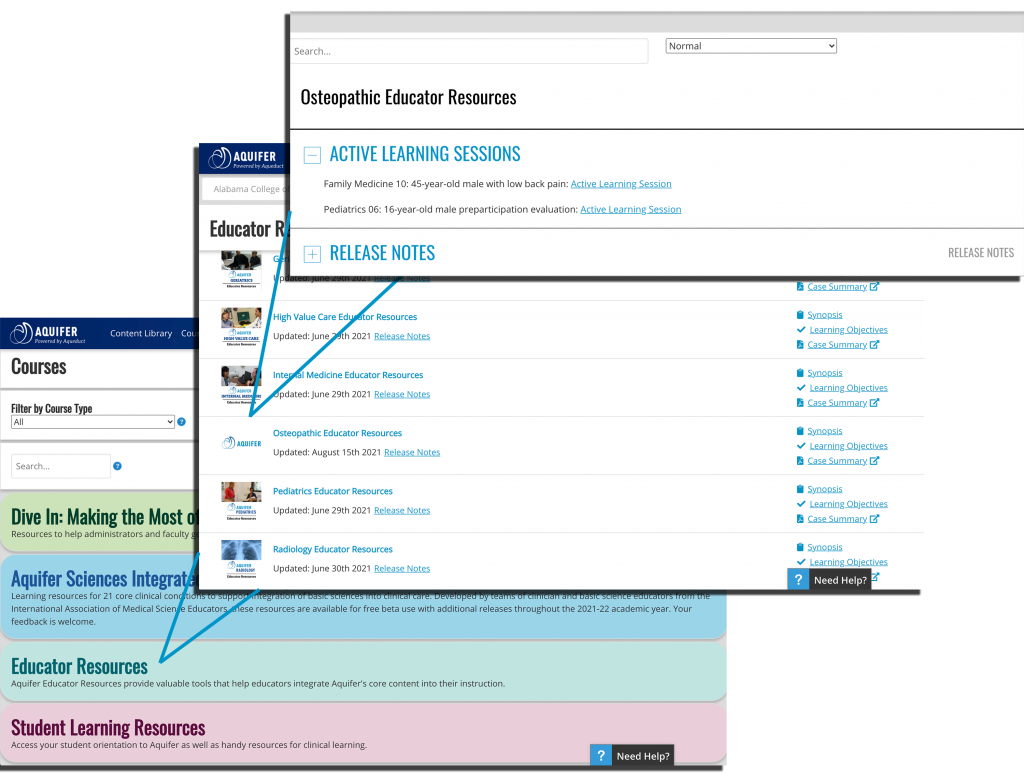
With the rise of the Delta variant of COVID-19, Aquifer has decided to resume offering our exams remotely for all exam users. This option is being reinstated to provide flexibility for faculty and learners as they manage disruptions to the learning environment. We hope that this helps you manage virtual courses during the COVID-19 crisis. We will continue to monitor the COVID-19 situation and may return to in-person proctoring in the future. Video proctoring will be available for all Aquifer exam users through March 15, 2022.
Although our preference remains for institutions to provide Aquifer exams in a proctored setting, spaced with social distancing, we recognize that many schools must now administer examinations outside of a classroom environment. For more information, please contact exams@aquifer.org to reach us. Please also visit our Learning Resources to Use as COVID Surges blog post for more tips and resources on how to maximize your Aquifer subscription.
Aquifer is pleased to announce the launch of a new course, Aquifer Foundations in Telemedicine, on October 15, 2021. The course will include four free, publicly available cases which provide key foundational knowledge to help students get started in telehealth. The new, short cases are a quick and easy way for students to become familiar with the principles and practice of telemedicine through self-directed learning in less than an hour.
Through the Aquifer telemedicine cases, students will learn how to build a patient history based on clinical condition, perform a physical exam, and manage a patient all through telemedicine. In total, all four cases should take students less than an hour to complete, providing a fast, effective tool for faculty to incorporate this rapidly expanding facet of healthcare into their teaching. The four cases available will be:
Aquifer subscribers will also have access to an Educator Guide that will accompany the Foundations in Telemedicine to help faculty quickly get up to speed and optimize the way that they use these cases in their pedagogy.
Aquifer Foundations in Telemedicine is appropriate for both students in clinical rotations and those still in the pre-clinical phase of their education. Content for these cases is aligned with AAMC telemedicine competencies and authored by medical educator members of the Society for the Teaching of Family Medicine (STFM) and the Clerkship Directors in Internal Medicine (CDIM). The cases are designed to fit in various points in the curriculum so that programs are able to include telemedicine competencies into existing components of their curricula. By integrating these cases, students in health professions educational programs will gain a stronger basis in telemedicine, thus preparing them to deliver high-quality, safe care via this fast-growing care delivery method. This set of cases also allows for a wider range of faculty to be able to teach about telemedicine, as the cases and educator guide provide a blueprint for instruction, and saves time by providing access to ready-made course materials.
On October 15, all Aquifer subscribers will automatically have access to Foundations in Telemedicine through their Aquifer accounts including the ability to search for them via the Searchable Content Library and combine them with other cases and or Integrated Illness Scripts into custom courses. Free access to the case content will be also available to non-subscribing teachers and learners via Aquifer.org.
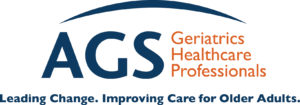
Aquifer congratulates consortium members Mandi Sehgal, MD, and Becky Powers, MD, AGSH, on their honors presented by the American Geriatrics Society (AGS).

Dr. Mandi Sehgal was recently presented with the Outstanding Mid-Career Clinician Educator of The Year Award at the AGS Virtual Annual Meeting. This award recognizes a faculty member for impressive work in geriatrics education. Although she was the 2020 recipient of this award, because of the cancellation of last year’s event due to the COVID-19 pandemic, she was awarded her honor at this years meeting. Dr. Sehgal is a geriatric medicine clinician-educator at the Cleveland Clinic Weston. At Aquifer, she serves as the Teaching & Learning Lead, as well as a Case Author on the Aquifer Geriatrics course board.
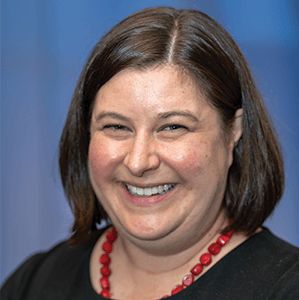
Dr. Becky Powers has been named one of fifteen AGS Fellows – a “select group of experts recognized for their deep commitment to the AGS and to advancing high-quality, person-centered care.” A a clinician educator in the South Texas Veterans Health Care System GRECC, and an Assistant Professor of Medicine in the Division of Geriatrics, Gerontology, and Palliative Medicine, Dr. Powers is an associate editor on the Aquifer Geriatrics course board.
Aquifer is a thriving, collaborative community of healthcare education leaders deeply committed to driving innovation in teaching and learning. The Aquifer Educators Consortium brings together more than 70 healthcare educators across disciplines to collaborate, innovate, and make advances in health professions education. For educators and healthcare providers, participation in the Consortium offers a unique cross-disciplinary peer community and an exciting opportunity for academic scholarship and advancement.
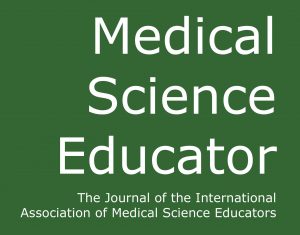
Aquifer is excited to share an important new publication in Medical Science Educator: “Thinking Slow More Quickly: Development of Integrated Illness Scripts to Support Cognitively Integrated Learning and Improve Clinical Decision-Making“. The article is authored by the Aquifer Sciences Leadership Team of Leslie Fall, MD; Robin English, MD; Tracy B. Fulton, PhD; David M. Harris, PhD; Khiet Ngo, DO, MS; James Nixon, MD, MHPE; Jacqueline Hembrook-Short, MA, MS, PhD; and Amy Wilson-Delfosse, PhD.
In this publication, the authors explain the evidence-based, interdisciplinary approach to developing Integrated Illness Scripts and Mechanism of Disease Maps, and outline the benefits of using these new pedagogical tools to improve developing clinical decision-making skills. Integrated Illness Scripts are specifically designed to provide a framework for cognitive integration, creating a new mental model for learners and an opportunity for faculty collaboration. By incorporating Integrated Illness Scripts, a nationally-developed learning tool into instruction, clinical learners are able to improve both inductive and deductive reasoning skills more quickly and accurately diagnose patients. Integrated Illness Scripts were designed by a multi-institutional and multidisciplinary group of leading clinical and basic science educators.
Aquifer’s Integrated Illness Scripts will be available July 1 to Aquifer Curricular Partners. Aquifer Curricular Partners are programs that subscribe to all five subscription-based Aquifer signature courses.
About the Medical Science Educator
This journal offers all who teach in healthcare the most current information to succeed in their task by publishing scholarly activities, opinions, and resources in medical science education. Articles focus on teaching the scientific skills which are fundamental to modern medicine and health, including basic science education, clinical teaching and the incorporation of modern education technologies. The Journal aims to provide its readers with a better understanding of teaching and learning techniques, in order to advance medical science education. The journal is an official peer-reviewed publication of the International Association of Medical Science Educators (IAMSE).
About Aquifer
Aquifer is a unique mission-driven non-profit organization dedicated to delivering the best health care education through collaborative development and research into innovative, high-impact virtual teaching and learning methods. With 15 million virtual patient cases completed since its founding in 2006, Aquifer is the leader in developing clinical learning tools for health professions education.
Aquifer is excited to announce that two new cases on Interventional Radiology (IR) will be added to the Aquifer Radiology course beginning on July 1, 2021. The new cases, which cover the role of IR and the basics of common problems, are designed to build a foundational understanding of how to use IR as a consultation service, providing valuable knowledge for learners advancing to any specialty.
“IR is at the forefront of modern medicine with increasing interest in and demand for IR services, but it is not a conventional part of the undergraduate medical curriculum. Student exposure to IR is frequently inadequate, as few programs across the country have included fundamentals of incorporating IR in patient care in the curriculum,” said Jeffery Hogg, MD, of West Virginia University and Senior Director of Aquifer Radiology. “Our team is excited to provide these new cases, developed specifically for undergraduate learners to fill this important gap in medical and health professions education.”
Both of the new cases are focused on IR consultation and the interchange between the referring service and IR service, helping learners understand how IR fits into overall patient care. The first case, Radiology Case 20: Interventional Radiology – Vascular, takes place in a busy hospital-based interventional radiology practice. The team manages different vascular problems in scheduled patients along with unplanned schedule interruptions. Radiology Case 21: Interventional Radiology – Nonvascular, walks the learner through a typical day in the interventional radiology suite, where the learner will assess patients and apply ACR Appropriateness Criteria to determine appropriate nonvascular interventional procedures, and learn basic workup of patients for interventional procedures.
The new cases are applicable to medical students, as well as physician assistant and nurse practitioner students. Teams of medical educators authored and peer-reviewed the new cases, in keeping with Aquifer’s rigorous content development standards. Like all Aquifer signature cases, both Interventional Radiology cases can be added to any custom course and include student progress reporting. Subscribers to Aquifer Radiology will find the new cases accessible from the Aquifer Radiology signature course and the searchable Content Library on July 1, 2021.

Aquifer congratulates Ravishankar Ramaswamy, MD, Amit A. Shah, MD, Kathryn M. Denson, MD, Mandi Sehgal, MD, Quratulain Syed, MD, Becky B. Powers, MD, Andrea Wershof Schwartz, MD, MPH, Rosanne M. Leipzig, MD, PhD, and Lauren J. Gleason, MD, MPH on their recent publication of their research letter Teaching geriatrics during the COVID-19 pandemic: Aquifer Geriatrics to the rescue, in the Journal of the American Geriatrics Society.
“When many institutions transitioned to online learning during the height of the pandemic, Aquifer Geriatrics came to the rescue and provided an engaging way to fill the void of in-person teaching.”
The authors investigate how the use of Aquifer Geriatrics grew exponentially during the COVID-19 pandemic, especially among Nurse Practitioner and Physician’s Assistant programs, and how programs continued to subscribe to Aquifer Geriatrics after the ending of the grant-funding period. Furthermore, the authors note that learner satisfaction grew from pre-pandemic levels, through the grant-funded period, to the subscription-based access period. The full article can be accessed here.
About the American Geriatrics Society
Founded in 1942, the American Geriatrics Society (AGS) is a nationwide, not-for-profit society of geriatrics healthcare professionals that has—for more than 75 years—worked to improve the health, independence, and quality of life of older people. Its nearly 6,000 members include geriatricians, geriatric nurses, social workers, family practitioners, physician assistants, pharmacists, and internists. The Society provides leadership to healthcare professionals, policymakers, and the public by implementing and advocating for programs in patient care, research, professional and public education, and public policy. For more information, visit AmericanGeriatrics.org.
About Aquifer
Aquifer is a unique mission-driven non-profit organization dedicated to delivering the best health care education through collaborative development and research into innovative, high-impact virtual teaching and learning methods. With 15 million virtual patient cases completed since its founding in 2006, Aquifer is the leader in developing clinical learning tools for health professions education.
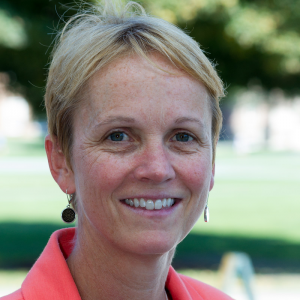
Aquifer congratulates Jennifer Bierman, MD, Aquifer Student Engagement Co-Lead, on receiving the Louis N. Pangaro, MD Educational Program Development Award. This award, presented by the Clerkship Directors in Internal Medicine (CDIM) at their Annual Meeting, recognizes a CDIM member who has contributed to the development of an outstanding educational program. CDIM is a member organization of the Alliance for Academic Internal Medicine (AAIM).
Dr. Jennifer Bierman is receiving this award based on her extensive work integrating interprofessional and online learning related to electronic health records. Her award nomination states that she “successfully led a team to pilot a case in this format and is now creating a library of cases demonstrating different medical specialty and health professions interactions with the electronic health record. Implementation of this project is ongoing but [Dr. Bierman] has created a team who is committed to the dissemination of their findings.”
At the Northwestern University Feinstein School for Medicine, Dr. Bierman serves as Associate Professor of Medicine and Medicine Education and Clerkship Director ECMH (Education Centered Medical Home). A member of CDIM since 2005, Dr. Bierman is a former member of the CDIM Program Planning Committee and has presented multiple plenary and workshop sessions at Alliance conferences. She earned her MD from the University of Minnesota Medical School and completed her residency in internal medicine at the University of Chicago Medical Center.
At Aquifer, Dr. Bierman is Student Engagement Co-Lead, where she works with the Aquifer Student Advisory Group, a group of medical and health professions students that provide essential feedback on Aquifer’s learning tools. She is also a past member of the Aquifer Internal Medicine Course Board and case author. All of us at Aquifer congratulate Dr. Bierman on this important national honor.
Aquifer is a thriving, collaborative community of healthcare education leaders deeply committed to driving innovation in teaching and learning. The Aquifer Educators Consortium brings together more than 70 healthcare educators across disciplines to collaborate, innovate, and make advances in health professions education. For educators and healthcare providers, participation in the Consortium offers a unique cross-disciplinary peer community and an exciting opportunity for academic scholarship and advancement.
Aquifer is pleased to announce the upcoming release of our new Social Determinants of Health Course on July 1, 2021. This course will include an overview module and two virtual patient cases to be available free of charge to all teachers and learners, whether or not they subscribe to Aquifer. We are proud to provide universal access to content focusing on this critically important topic in health care education.
As the leading provider of online health professions education teaching and learning tools, Aquifer is dedicated to ensuring that our educational materials do not perpetuate stereotypes in healthcare and education and that our courses incorporate continuous review and contemporary teaching about social determinants of health. The launch of this new course content is one step in advancing learning explicitly related to these topics in our content library.
As of our July 1, 2021 launch, the Aquifer Social Determinants of Health includes three modules:
Programs with a current Aquifer subscription will also have access to an accompanying educator guide with learning objectives and a new active learning module, providing a ready-to-use optional classroom activity to be used in conjunction with the cases. Subscribers will also be able to view student progress reporting and add the new cases to a custom course. This course, like all Aquifer content, is evidence-based, peer-reviewed, and will be continuously updated.
Aquifer’s previous Culture in Healthcare course was retired on October 22, 2020, in order to thoroughly update the content and teaching about bias, health inequities, and healthcare outcomes. The Aquifer Social Determinants of Health Course builds on reframed versions of two former Culture in Healthcare cases. Cases have been revised to remove language and content related to cultural competency, and thoroughly reviewed to eliminate bias and stereotyping. The shorter, reformatted cases do retain the reflective components that were a part of the original Culture in Health cases.
Programs that requested special access to Aquifer Culture in Healthcare to complete their coursework have access to the archived course through June 30, 2021. As of July 1, the new Social Determinants of Health course will be available as a contemporary replacement for all teachers and learners. If you are currently using Aquifer Culture in Healthcare, please be sure to download any case completion reports that you need for those cases prior to June 30. For more details, view our side-by-side learning objectives comparison for Aquifer Culture in Healthcare and Social Determinants of health.
Following a thorough review of all existing Aquifer cases according to our peer-reviewed and published criteria, our cases continue to be regularly reviewed based on these principles by teams of medical educators, with an eye toward optimizing this process to further ensure that current best practices are consistently integrated across our course library.
Aquifer looks forward to advancing this work and continuing to support faculty and students with contemporary, inclusive teaching resources.

Aquifer will be attending the COMSEP Annual Meeting from April 6 – 9, 2021, taking place virtually, to share updates on our developing projects and help faculty and staff make the most of their subscriptions.
If you are attending the meeting, we hope to see you at:
Friday, April 9 from 11:45am – 1:15pm EDT
Coaching For the Development of Master Adaptive Learners
Presenters: Melissa Held, MD; Michael Dell, MD; Aditee Narayan, MD; Sherilyn Smith, MD
The pace of the development of new biomedical knowledge and of changes in healthcare systems requires physicians and medical students to develop the ability to seamlessly adapt new information and concepts into their existing mental frameworks in order to become experts. Never has this dynamic been more in evidence than during the COVID-19 pandemic, in which new knowledge, skills, and processes of care have arisen at a furious rate. In order to develop into what the American Medical Association has termed Master Adaptive Learners, medical students, typically highly-motivated learners, will benefit from coaching from their clinical teachers to facilitate their self-regulated learning and help them develop the habits of mind required for making clinical decisions in modern practice.
In this workshop, we will present a schemata of the Master Adaptive Learner process and introduce novel tools to aid family physician faculty as they coach their students towards their development of cognitive mastery. The workshop will combine didactic presentation and practical application of the new coaching tools so that attendees will come away with useful skills to bring back to their home institutions. The presenters will encourage active discussion and group participation so as to benefit from the shared experience in the room in developing best practices for making use of the novel cognitive coaching framework and tools.
Learning Objectives:
Wednesday, April 7 from 1:45pm – 2:45pm
Connect directly with your COMSEP colleague members of the Aquifer Pediatrics Course Board. Bring your questions, ask for integration and teaching advice, and get the latest updates on:
If you aren’t able to make the Programs & Partners session but would like to catch up to discuss our developing projects or get answers to your questions, please contact Cate Hancock, Aquifer RelationshipManager to schedule a time to meet or talk by phone.
We look forward to seeing you!
We recommend attending the following presentations by Aquifer Educators Consortium members:
Friday, April 9 from 1:45 – 3:15pm EDT
Presenters: Anton Alerte, MD; Mary Brown, MD, MS; Antonette Spoto-Cannons, MD; Jennifer Koestler, MD; Melissa Held, MD; Mariann Kelley, MD; Joanne Crowley, MD; Melanie Rudnick, MD; Amy Fleming, MD, MHPE; Patricia Joyce, MD
This workshop involves collaboration among faculty from five different universities to address the subject of medical student remediation. Student success may be challenged due to a number of factors including knowledge deficits, gaps in reasoning, failure to perform in a team setting, and/or professionalism lapses.
Learning Objectives:
This workshop will provide faculty with a framework for helping the student who has failed or is failing.
Participants will:
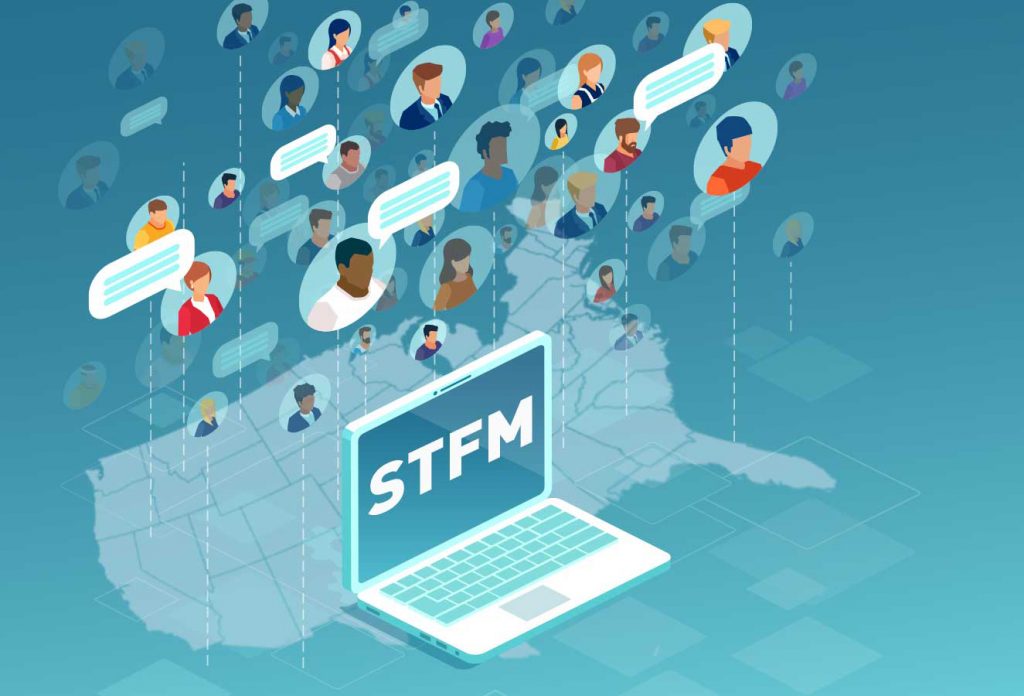
If you’re registered for STFM’s Medical Student Education Conference on February 1-4, 2021, be sure to catch our video presentations and join your colleagues from the Aquifer Family Medicine Board for a Zoom chat. We look forward to connecting with you at this year’s virtual meeting.
You don’t want to miss these presentations–block some time on your calendar to catch these recordings.
On-demand Video Presentation (21 minutes) – Sign in to watch with your STFM conference registration
Presentation OD63 under EPAs, LCME and OSCEs
This is a joint presentation between members of the Aquifer Family Medicine Course Board, a representative from the STFM National Clerkship Curriculum, and an STFM representative to the NBME. We presented about the alignment of the learning objectives and issues we have discovered in our curricular mapping.
Presenters:
On-demand Video Presentation (30 minutes) – Sign in to watch with your STFM conference registration
OD94 under Preceptors: Recruitment, Retention, and Relationships
Explore how the Master Adaptive Learner Framework applies to clinical learning and how Aquifer’s formative assessment approach supports the development of mastery learning. We will demonstrate a coaching approach to facilitate a rich student-faculty dialogue and create personalized plans for mastery learning using real-world examples from Aquifer’s formative assessment.
Presenters:
Monday, February 1: Anytime from 2:30-3:30pm CT (Direct Zoom Link)
Tuesday, February 2: Anytime from 2:30-3:30pm CT (Direct Zoom Link)
Can’t make those times but want to catch up? Contact us to set a quick meeting.
Drop-in to our “Conference Partners Meet and Greet” session and connect with members of the Aquifer Educators Consortium and our dedicated Aquifer staff to:
Senior Director: David Anthony, MD, MSc (Brown University)
Curriculum Lead: Katie Margo, MD (University of Pennsylvania)
Teaching & Learning Lead: Elizabeth Brown, MD (University of Rochester)
Assessment Lead: Jason Chao, MD (Case Western Reserve University)
Associate Editors:
Aquifer is pleased to announce the addition of new self-assessment questions (SAQs), as of January 4, 2021, to ten Aquifer Geriatrics and nine Aquifer High Value Care cases. Students and faculty will find the new questions available at the conclusion of each case listed below. Aquifer’s multiple-choice SAQs, found at the end of cases throughout Aquifer’s signature courses, reinforce key concepts taught in the case and extend learning beyond a single scenario. Each SAQ includes an explanation for why each answer option is correct or incorrect and provides additional information to help students understand the associated clinical decision point. Each question and answer explanation is written and peer-reviewed by a team of medical educators.
For students, the self-assessment questions provide a safe space to check their understanding and practice applying knowledge to new patients and problems. Student work is not visible to faculty.
Faculty should be aware of this new addition when assigning cases to students and understand that student work on these multiple-choice questions is not visible to preserve the student’s learning experience. As always, case completion status and time on case data will be available in reporting.
As of January 4, self-assessment questions are available for the following cases. Questions are currently in development for the rest of Aquifer’s Geriatrics and High Value Care cases.
Aquifer Geriatrics
Aquifer High Value Care
Thank you to the teams of medical educators who worked hard to write and peer-review the newly available self-assessment questions to support and enhance student learning in Aquifer’s cases.
Geriatrics Question Authors & Reviewers
Aquifer Geriatrics Assessment Lead: Ravishankar Ramaswamy, MD – Icahn School of Medicine at Mount Sinai
High Value Care Question Authors & Reviewers
Aquifer High Value Care Assessment Lead: Amit Pahwa, MD – John Hopkins University

Aquifer is excited to announce an opportunity to join a national board of interprofessional students tasked with providing critical feedback on the development of Aquifer’s new learning tools. Following the success of our inaugural Student Advisory Group in 2020, we are now recruiting a new group of students to serve on the group for 2021. Medical and physician assistant students are invited to apply to serve on the 2021 Student Advisory Board.
Aquifer—a unique non-profit organization—makes a big impact on medical and health professions education. Used in 97% of U.S. allopathic medical schools, 66% of U.S. osteopathic programs, and a growing number of physician assistant and nurse practitioner programs—with over 15 million virtual patient cases completed since our founding in 2006—Aquifer is a leader in clinical learning.
Aquifer is in the process of developing new assessments, cases, and other learning tools. Student voices and ideas are needed to ensure that our solutions provide the most value to students.
Selected students will be invited to preview and provide honest, constructive feedback on Aquifer’s new developing learning tools, designed to be used in medical and health professions programs across the country. Feedback from this group will be used to optimize the technology and content in our tools, inform communications, and develop training resources.
A letter of recognition will be provided at the end of the year.
We are accepting applications from students who have completed Aquifer cases either as part of their coursework or have used our free cases on their own and meet the following requirements:
Applications closed on December 18, 2020. Students will be notified of their status by January 8. Please contact Karey Waters, Aquifer Communications and Insights Manager, with any questions.
Aquifer is excited to announce that a new case on Advance Care Planning is now available in the Aquifer Geriatrics course. The new case models communication and management of end-of-life care and advance care planning (ACP), and is designed to deliver the core knowledge needed for students and providers to develop skills in these critically important topics.
The case, Aquifer Geriatrics case 27, follows a 76-year-old woman with advanced COPD, as she completes advance care planning with her daughter and primary care physician. Her daughter, who is her medical power of attorney, makes medical decisions on her mother’s behalf as she experiences debilitating events. Key learning points in the case include advance care planning, advance directives, surrogate decision-makers, and disease-specific goals of care conversations. Case content includes short videos modeling a successful discussion on ACP with a patient and family member.
The new case is appropriate for all health professions students and fills a need for educational materials with a geriatric-specific approach to advance care planning. Teams of medical educators authored and peer-reviewed the new case, in keeping with Aquifer’s rigorous content development standards. The case content provides coverage of five learning objectives from the AAMC/JAHF Minimum Geriatrics Competencies for Medical Students.
Like all Aquifer signature cases, Advance Care Planning can be added to any custom course and includes student progress reporting. From your Aquifer account, the new case is accessible from the Aquifer Geriatrics signature course and via the searchable Case Library.
Aquifer is pleased to announce plans to develop an online course on Principles and Practice of Excellence in Palliative Care, designed for undergraduate health professions students, made possible by a grant award from the Arthur Vining Davis Foundations. The goal of this project is to build a practice-ready healthcare workforce that knows the principles of palliative care and can use them to deliver high value, compassionate care to chronically ill patients using a shared mental model.
The Principles and Practice of Excellence in Palliative Care will fill an important gap in healthcare professional training. Despite the existence of published competencies for teaching palliative care principles to undergraduate healthcare professional students, most existing online palliative care training is aimed at continuing medical education. Multiple medical specialties, including internal medicine, surgery, and cardiology describe a critical need to formalize training for physicians in training. (Edwards A, Nam S; Crousillat DR, Keeley BR, et al; Wancata LM, Hinshaw DB, Suwanabol PA). A recent bill passed in the US House of Representatives and currently with the US Senate has addressed the need to fund palliative care training. (https://www.congress.gov/bill/116th-congress/house-bill/647).
Aquifer will leverage our collaborative network of educators and partners, trusted pedagogy and content, and widely used teaching and learning platform to deliver quality online training that addresses critical gaps in palliative care learning across undergraduate healthcare education. The new course will address the clear need for standardized educational curricula on palliative care.
The palliative care course development will be led by Dr. Sherilyn Smith, Aquifer Chief Academic Officer and Professor of Pediatrics at the University of Washington, and Dr. Mandi Sehgal, Geriatric Medicine Fellowship Program Director, Cleveland Clinic Florida Clinical Affiliate Professor, Florida Atlantic University Charles E. Schmidt College of Medicine. Initial work is scheduled to begin in the fall of 2020.
“The grant award from the Arthur Vining Davis Foundations enables us to begin the collaborative work of developing standardized curriculum and clinical learning tools for palliative care,” said Sherilyn Smith, MD. “We are honored to be working toward supporting students and faculty with the resources they need to make a real difference in improving patient care in this critical area.”
Aquifer is a unique non-profit organization deeply committed to driving innovation in clinical teaching and learning. Used in 97% of U.S. allopathic medical schools, 66% of U.S. osteopathic programs, and a growing number of physician assistant, and nurse practitioner programs—with over 15 million virtual patient cases completed since our founding in 2006—Aquifer is a leader in clinical learning.
The Arthur Vining Davis Foundations were established in 1952 by former ALCOA chairman, Arthur Vining Davis. Grounded in Arthur Vining Davis’s principled and innovative leadership in national corporate life and philanthropy, the Arthur Vining Davis Foundations strengthen America’s intellectual life, humane instincts, and democracy through philanthropic support for private higher education, public educational media, interfaith leadership and religious literacy, the environment, and palliative care.
Aquifer stands in solidarity with our healthcare professional colleagues and students around the United States as we work to alleviate the racial and healthcare disparities that continue to be a critical public health issue in our country.
As the leading provider of online health professions education teaching and learning tools, we feel a deep responsibility to ensure that our educational materials do not perpetuate stereotypes in healthcare and education, our courses incorporate contemporary teaching about social determinants of health and structural factors leading to bias, and that we actively promote equitable healthcare education for underrepresented student populations.
We have been dedicated to these ideals from the onset, but there is always more work to be done. Our specific next step actions will include:
We are dedicated to the success of our learners and their future patients and accept the responsibility to address these issues in a respectful, inclusive, humble, and sustained manner that reflects our core values and that of the healthcare profession in which we serve.
Sherilyn Smith, MD
Aquifer Chief Academic Officer
Professor of Pediatrics, University of Washington
Leslie Fall, MD
Aquifer Chief Executive Officer
Colleagues,
As the COVID-19 outbreak expands, student access to patient care is being restricted with unprecedented scope. The uncertainty of this evolving situation is impacting student opportunities to learn and heightening concerns about the vulnerability and quality of student education. Aquifer is committed to helping you meet this challenge, and to support you as you stretch to care for both your students and for your community’s patient population. To do our part during this difficult time, Aquifer is offering access to 146 cases and WISE-MD to our subscribing schools at no additional charge through June 30, 2020.
Aquifer’s virtual patient cases about core clinical conditions, developed by your colleagues to meet your national educational objectives, are—by design—available to fill the gaps you are experiencing in your student’s clinical training. We want you to be able to take full advantage of your Aquifer cases during this outbreak to help supplement clinical experiences that your students may be lacking due to access restrictions. Whether your students are impacted in the pre-clerkship phase and unable to attend preceptorships, or in the clinical phase and restricted from the inpatient units, clinics, operating or radiology reading rooms, we are here for you.
If you need more content than is currently available in your subscription in order to temporarily support impacted learners, we are taking the unprecedented step of providing free access to 146 Aquifer signature cases and WISE-MD through June 30, 2020, to all current Aquifer institutional subscribers. This includes:
Family Medicine (40 cases)
Internal Medicine (36 cases)
Geriatrics (26 cases)
Pediatrics (32 cases)
Radiology (19 cases)
WISE-MD (37 surgery modules), provided by NYU Grossman School of Medicine
Additional course access will be provided by request only and will require completion of a short application available starting on Thursday, March 12th at aquifer.org/covid19. The purpose of the application is to provide us with some additional details required to meet the needs at your school. The application must be completed by the single point of contact for your program’s Aquifer subscription, *|PSA|*.
Remember, Aquifer’s searchable case library can help you search across all available cases by diagnosis, presenting problem, system, and more to find the cases you need to fill your emerging gaps. Our custom course feature is available to then help you build courses and assign cases to individual students or groups.
As medical educators ourselves, we understand the challenges you are facing are extraordinary and we here to support you and your students. We hope that these additional resources will alleviate some of the difficulties your students may face. We will be sending an update when the application for additional content is available. In the meantime, please visit aquifer.org/covid19 for additional details, updates, and training on using the learning tools and content available with your subscription.
Sincerely,
Sherilyn Smith, MD
Aquifer Chief Academic Officer
Professor of Pediatrics and Infectious Disease
University of Washington School of Medicine
Leslie Fall, MD
Aquifer Executive Director & Chief Executive Officer

Aquifer is excited to announce the launch of our Student Advisory Group. This newly formed board of medical and health professions students will provide essential feedback on Aquifer’s new learning tools.
Aquifer is in the process of developing new assessments, Integrated Illness Scripts, cases, and other learning tools. Student voices and ideas are critical to ensure that our solutions provide the most value to students.
Student Advisory Group members are invited to preview and provide honest, in-depth feedback on Aquifer’s new developing learning tools, designed to be used in medical and health professions programs across the country. Feedback from this group will be used to optimize the technology and content in our tools, inform communications, and develop training resources.
After a competitive selection process, we are pleased to welcome a strong group of students from institutions around the country:
The Student Advisory Group will work closely with the medical educators of the Aquifer Student Engagement Group, a working group of the Aquifer Educators Consortium, along with the teams developing Aquifer’s new learning tools. The Aquifer Student Engagement Group is led by Katherine Chretien, MD (Associate Dean for Student Affairs; George Washington University School of Medicine & Health Sciences) and Jennifer Bierman, MD (Clerkship Director, Education Centered Medical Home; Northwestern University Feinberg School of Medicine).
Aquifer—a unique non-profit organization—makes a big impact on medical and health professions education. Used in 95% of U.S. allopathic medical schools, 66% of U.S. osteopathic programs, and a growing number of physician assistant, and nurse practitioner programs—with over 13 million virtual patient cases completed since our founding in 2006—Aquifer is a leader in clinical learning.
Aquifer is pleased to congratulate the recipients of the 2019 COMSEP (Council on Medical Student Education in Pediatrics) Grant Program awards. The COMSEP Grant Program is funded in part by an annual educational grant from Aquifer to support advancing academic research in medical education.
As a non-profit organization, Aquifer is proud to continue funding this important work through COMSEP which aligns directly with our mission of advancing healthcare education through collaborative development and research into innovative, high-impact virtual teaching and learning methods. The COMSEP Grant Program promotes and supports innovative educational scholarship that is designed, implemented, and evaluated by COMSEP members.
Aquifer joins COMSEP in congratulating the 2019 COMSEP Grant Program recipients on the advancement of their research:
The Effect of CMS Guidelines on the Development of Medical Student Documentation Skills
This project focuses on assessing the impact of the Centers for Medicare and Medicaid Services rule change that allows student medical notes to be used by their preceptors for billing. Surveys and focus groups have been conducted to understand the impact of this change on learning and perceptions and experiences with student documentation. Investigators have submitted abstracts to present this work at the 2020 COMSEP Annual Meeting, with plans underway for publication submissions.
The Effect of Pediatric Boot Camps on Performance in Early Internship
This study works to clarify whether pediatric-specific boot camp improves intern performance during the initial months of pediatric internships, and whether any difference persists at six months. Results will include faculty evaluations on interns from residency programs (17 are enrolled to date). Preliminary results will be presented at the COMSEP Annual Meeting in March 2020. This project is a joint project between COMSEP and APPD LEARN.
Aquifer (formerly MedU) has partnered with COMSEP since the 2006 launch of Aquifer Pediatrics (formerly CLIPP), which delivers on the learning objectives of the COMSEP curriculum. Aquifer’s grant program supports academic advancement through a series of partnerships with key national educator organizations. Working with our partners ensures that our grant dollars support initiatives that advance our mission and serve the needs of educators and students around the country. In 2019, Aquifer awarded grants totaling $65,000 a year to our national partner organizations:
Aquifer looks forward to the results of the 2019 COMSEP Grant Program projects and continuing to work with our partners to drive innovation in healthcare education.
Aquifer is a mission-driven non-profit organization dedicated to delivering the best healthcare education through collaborative development and research into innovative, high-impact virtual teaching and learning methods. Aquifer develops trusted, award-winning, virtual case-based courses derived from national healthcare curricula. Since Aquifer’s founding in 2006, over 13 million virtual cases have been completed by more than 300,000 students.

Aquifer is excited to announce a new opportunity to join a national board of interprofessional students tasked with providing critical feedback on the development of Aquifer’s new learning tools. Medical, physician assistant, and nurse practitioner students are invited to apply to serve on the new Student Advisory Board.
Aquifer—a unique non-profit organization—makes a big impact on medical and health professions education. Used in 95% of U.S. allopathic medical schools, 66% of U.S. osteopathic programs, and a growing number of physician assistant, and nurse practitioner programs—with over 13 million virtual patient cases completed since our founding in 2006—Aquifer is a leader in clinical learning.
Aquifer is in the process of developing new assessments, cases, and other learning tools. Student voices and ideas are needed to ensure that our solutions provide the most value to students.
Selected students will be invited to preview and provide honest, constructive feedback on Aquifer’s new developing learning tools, designed to be used in medical and health professions programs across the country. Feedback from this group will be used to optimize the technology and content in our tools, inform communications, and develop training resources.
Work will include:
Student Advisory Group members will have the option to apply to attend the Aquifer Educator Consortium’s Annual Meeting in early October in Portsmouth, NH. Attendance is not required; an open application process will be announced in the late spring/early summer. Students who are selected to attend will have travel expenses paid.
A letter of recognition is available by request.
The Aquifer Student Engagement Group is accepting applications from students who meet the following requirements:
OR
AND
If you are interested, please complete our short online application below by December 4, 2019. Students will be notified of their status by January 1. Please contact Karey Waters, Aquifer Communications and Insights Manager, with any questions.
Thank you,
Aquifer Student Engagement Co-Leads
Katherine Chretien, MD
Associate Dean for Student Affairs
George Washington University School of Medicine & Health Sciences
Jennifer Bierman, MD
Clerkship Director, ECMH (Education Centered Medical Home)
Northwestern University Feinberg School of Medicine
If you’ve reviewed our resources and tools and still need tech support, please complete a support ticket here.
| If you are experiencing an error (“The change you wanted was rejected“) when registering for the first time and you are using Safari, please try another web browser (Chrome, Firefox, etc.) |
Please provide as many details as possible about your issue.
Support Hours:
Aquifer is pleased to join the International Association of Medical Student Educators in congratulating the 19 recipients of the 2019 IAMSE Travel Awards. The awards contribute to travel and registration costs for students and junior faculty attending the IAMSE Annual Meeting, held this year in Roanoke, Virginia on June 8-11, 2019. Aquifer is proud to continue supporting this award in conjunction with IAMSE, our collaborating partner on the Aquifer Sciences Initiative. This year’s award is also sponsored by ProgressIQ.
Congratulations 2019 IAMSE Travel Award Recipients:
Students
Junior Faculty
Aquifer, a mission-based non-profit organization, has an annual grant program that supports academic advancement through a series of partnerships with key national educator organizations. In 2018, Aquifer granted over $65,000 to collaborating organizations. Working with partner organizations ensures that Aquifer’s grant dollars support initiatives that serve the needs of educators and students around the country.
Aquifer is a mission-driven non-profit organization dedicated to delivering the best healthcare education through collaborative development and research into innovative, high-impact virtual teaching and learning methods. Aquifer develops trusted, award-winning, virtual case-based courses derived from national healthcare curricula. Since Aquifer’s founding in 2006, over 12 million virtual cases have been completed by more than 300,000 students.
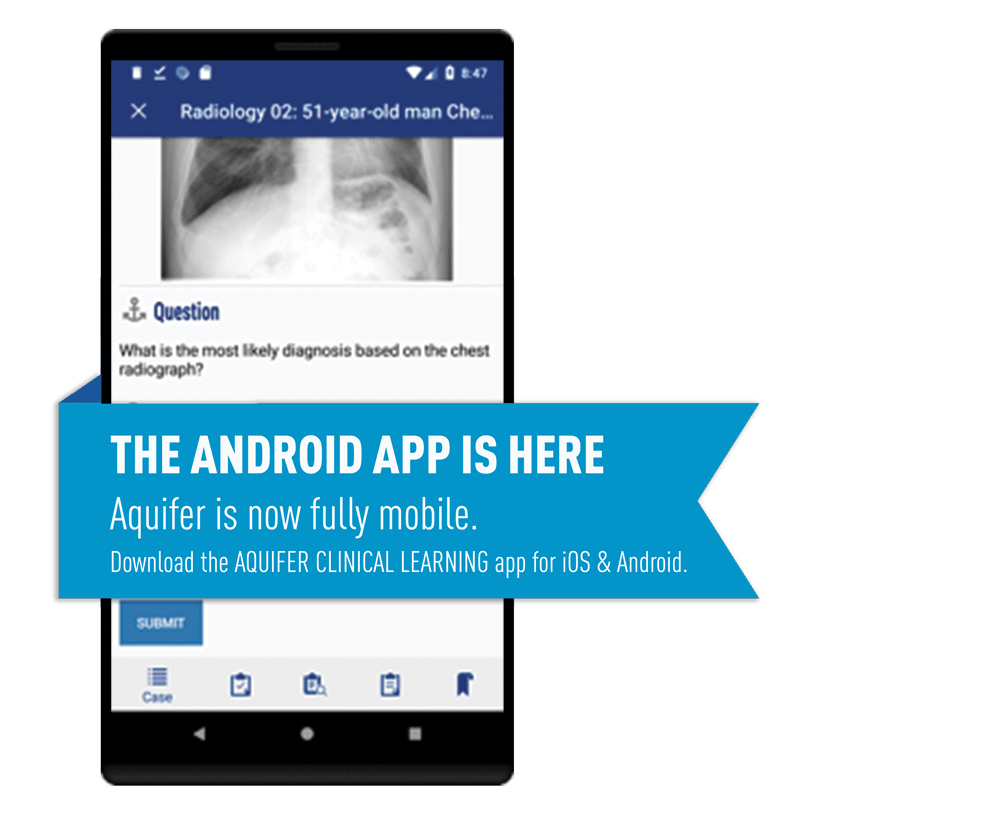
Aquifer is excited to announce that our Android app is now available for free download from the Google Play store. The Android app joins Aquifer’s previously released iOS app to provide a comprehensive mobile experience for users on a range of devices—anytime, anywhere.
Work Offline! Download cases in advance and complete work even without an internet connection. Case work will sync to individual Aquifer accounts when devices reconnect to the internet. Once a device has synced, progress can be viewed in student and course reports on your laptop or desktop computer. A few notes:
To download the app for your device, click on the button below, or search “Aquifer Clinical Learning” in the Google Play or App store.
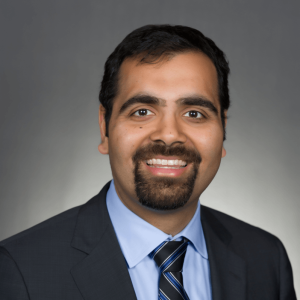
Aquifer congratulates Amit Pahwa, MD, Aquifer High Value Care Teaching and Learning Lead, on receiving the Louis N. Pangaro, MD Educational Program Development Award. This award, presented by the Clerkship Directors in Internal Medicine (CDIM) at their Annual Meeting, recognizes a CDIM member who has contributed to the development of an outstanding educational program. CDIM is a member organization of the Alliance for Academic Internal Medicine (AAIM).
Dr. Amit K. Pahwa is receiving this award based on his extensive work advancing medical education on the topic of High Value Care (HVC), both at Johns Hopkins University and on a national scale. At Johns Hopkins, Dr. Pahwa serves as an Assistant Professor of Medicine and Pediatrics; Director, Internal Medicine Sub-internship; and Associate Director, Pediatrics Core Clerkship. In addition, he is a leader in high value care education serving as Co-Director of his department’s HVC Committee, and Physician Lead of the interprofessional, interdisciplinary Johns Hopkins Health System High Value Care Committee. This committee won the Society of Hospital Medicine’s 2018 Excellence in Teamwork in Quality Improvement Award, and Johns Hopkins’ 2017 Innovations in Clinical Care Award.
Dr. Pahwa’s national work includes serving as an Executive Director on the High Value Practice Academic Alliance, which he worked to form in 2016 to create a national forum for academic institutions to collaborate on quality improvement, research, and education related to high value care. The alliance now includes more than 80 partner institutions in 18 different medical specialties, and hosts an annual national conference.
At Aquifer, Dr. Pahwa is an integral part of the Aquifer High Value Care Course Board, serving as Teaching and Learning Lead and Associate Editor. All of us at Aquifer congratulate him on this important national honor.
Aquifer is a thriving, collaborative community of healthcare education leaders deeply committed to driving innovation in teaching and learning. The Aquifer Educators Consortium brings together more than 70 healthcare educators across disciplines to collaborate, innovate, and make advances in health professions education. For educators and healthcare providers, participation in the Consortium offers a unique cross-disciplinary peer community and an exciting opportunity for academic scholarship and advancement.
Aquifer is pleased to congratulate the eight recipients of the 2019 Alliance for Academic Internal Medicine (AAIM) Innovation Grants, supported by an unrestricted educational grant from Aquifer. The AAIM Innovation Grant program seeks inventive approaches to addressing existing or emerging problems with impacts across the academic Internal Medicine community. As a non-profit organization, Aquifer is proud to continue funding this important work through AAIM which aligns directly with our mission of advancing healthcare education through collaborative development and research into innovative, high-impact virtual teaching and learning methods.
Aquifer joins AAIM commending the outstanding efforts of the grant finalists and congratulating the 2019 Innovation Grant recipients:
Aquifer (formerly MedU) has partnered with AAIM since the 2007 launch of Aquifer Internal Medicine (formerly SIMPLE), which delivers on the learning objectives of Clerkship Directors in Internal Medicine’s (CDIM) General Internal Medicine Core Medicine clerkship curriculum. Aquifer’s High Value Care and Diagnostic Excellence courses were both developed with funding from AAIM Innovation Grant awards.
Aquifer’s grant program supports academic advancement through a series of partnerships with key national educator organizations. Working with our partners ensures that our grant dollars support initiatives that advance our mission and serve the needs of educators and students around the country. In 2018, Aquifer awarded grants totaling more than $65,000 a year to the following organizations:
Aquifer looks forward to the results of the 2019 AAIM Innovation Grant funded projects and working with our partners to drive innovation in healthcare education.
Aquifer is a mission-driven non-profit organization dedicated to delivering the best healthcare education through collaborative development and research into innovative, high-impact virtual teaching and learning methods. Aquifer develops trusted, award-winning, virtual case-based courses derived from national healthcare curricula. Since Aquifer’s founding in 2006, over 12 million virtual cases have been completed by more than 300,000 students.

New York (April 5, 2019)—Among many breakthroughs that have made living longer possible, better health care—and more experts to make that care possible—loom large. Given that all of us are aging, we need more clinicians, researchers, and advocates to keep that momentum going. Ideally, for example, we’d already have more than 22,000 geriatricians in the U.S. (though at present less than 7,000 certified clinicians are practicing nationwide). With a limited number of geriatricians, how are we to train the next generation of clinicians to optimally care for older people? A new tool from the American Geriatrics Society (AGS) and Aquifer (the non-profit leader in developing clinical learning tools for health professions education) holds promise for bridging that gap. Aquifer Geriatrics (available at Aquifer.org/Courses/Aquifer-Geriatrics/), the AGS national online curriculum in geriatrics, is leveraging e-learning and geriatrics’ thought-leadership to advance much-needed training to care for older adults.
“Almost every health professional in the U.S. will care for older patients at some point in their training or careers,” explains Amit Shah, MD, Associate Dean for Faculty Affairs at the Mayo Clinic Alix School of Medicine, “yet learning about what makes that care unique has varied in duration and even content in the past, often due to a limited number of geriatrics educators at our health professions schools. Developed initially with funding from the Donald W. Reynolds Foundation, the cases that make up Aquifer Geriatrics provide up-to-date, evidence-based content in geriatrics education. They teach healthcare professionals how to appropriately care for older adults, and they make it easy to do so even if a geriatrician is not immediately available to teach some of the basics.”
The idea behind Aquifer Geriatrics is simple: Learners at subscribing institutions have instantaneous access to each of 26 evidence-based, peer-reviewed cases addressing the fundamentals of caring for older adults. The Aquifer Geriatrics curriculum was developed by experts from the AGS and Association of Directors of Geriatric Academic Programs (ADGAP) using the framework of the Association of American Medical Colleges (AAMC)/John A. Hartford Foundation Minimum Geriatrics Competencies for Graduating Medical Students. Cases meet the needs of today’s learner as they can be completed at their own pace, without being bound to a traditional “classroom.” Subscriptions ensure that the course will be sustainable, providing consistent funding for operations such as content updates from a dedicated board of top educators, maintenance, and support.
“Each of the 26 cases delivers knowledge and skills, but also models a geriatrics health professional’s approach to care,” Mandi Sehgal, MD, Associate Professor of Geriatric Medicine at Florida Atlantic University Charles E. Schmidt College of Medicine, explains. “Rather than focusing on the myth of ‘one right answer,’ each of the cases teaches clinical reasoning and reflects the nuances of what it takes to do what geriatrics does best: Deliver high quality, person-centered care with a focus on function and quality of life.”
An article published today in the Journal of the American Geriatrics Society (JAGS; DOI:10.1111/jgs.15813) introduces the Aquifer Geriatrics curriculum and walks through several of its early successes, as well as strategies to help clinicians and institutions adopt the platform. In a related editorial also published in JAGS (DOI: 10.1111/jgs.15901), independent educational experts noted that the program holds promise for “helping to fill the gap that is left by the shortage of geriatrics educators” in preparing the field to “play the long game,” thanks to innovative solutions to education.
Aquifer Geriatrics cases can be completed on smartphones, tablets, or computers, and can be used independently or by schools with curricular time available to students. The cases also are appropriate for a host of health professionals, from internal and family medicine residents to physician assistants, nurse practitioners, and geriatrics fellows. For more information or to learn about subscription options, visit Aquifer.org/Courses/Aquifer-Geriatrics/.
About the American Geriatrics Society
Founded in 1942, the American Geriatrics Society (AGS) is a nationwide, not-for-profit society of geriatrics healthcare professionals that has—for more than 75 years—worked to improve the health, independence, and quality of life of older people. Its nearly 6,000 members include geriatricians, geriatric nurses, social workers, family practitioners, physician assistants, pharmacists, and internists. The Society provides leadership to healthcare professionals, policymakers, and the public by implementing and advocating for programs in patient care, research, professional and public education, and public policy. For more information, visit AmericanGeriatrics.org.
About Aquifer
Aquifer, formerly known as MedU, is a unique mission-driven non-profit organization dedicated to delivering the best health care education through collaborative development and research into innovative, high-impact virtual teaching and learning methods. With 12 million virtual patient cases completed since its founding in 2006, Aquifer is the leader in developing clinical learning tools for health professions education.
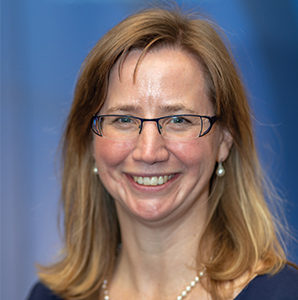
Aquifer congratulates Valerie J. Lang, MD, MHPE, Aquifer’s Academic Director for Assessment, on receiving the Ruth-Marie E. Fincher, MD, Service Award. This award, presented by the Clerkship Directors in Internal Medicine (CDIM) at their Annual Meeting, recognizes a CDIM member who has made an outstanding contribution to the organization. CDIM is a member organization of the Alliance for Academic Internal Medicine (AAIM).
Dr. Lang’s current and past national committee work for AAIM and CDIM includes serving on the Clerkship Directors in Internal Medicine (CDIM) Council; as CDIM President (2014-2015); on the AAIM Board of Directors; and as Co-Chair of the AAIM High Value Care Working Group. She is an Associate Professor of Medicine in the Hospital Medicine Division at the University of Rochester. Dr. Lang directed the Internal Medicine Clerkship for 13 years and the Medicine Sub-Internship for 15 years. She currently directs the Hospital Medicine Faculty Development Program and is the inaugural director of the Meliora in Medicine course and thread through all 4 years of the medical school curriculum.
As the Aquifer Academic Director for Assessment, Dr. Lang provides strategic guidance to inform Aquifer’s non-profit mission of advancing health professions education. She is currently leading the development of innovative new formative assessments for a range of disciplines, and led a multi-institution validation study of Aquifer Internal Medicine’s Clinical Decision-Making Exam (formerly the Key Features Exam) that was recently published in Academic Medicine. She is also a past Co-Editor-in-Chief of the Aquifer Internal Medicine course.
All of us at Aquifer congratulate Dr. Lang on receiving this national honor.
Aquifer is a thriving, collaborative community of healthcare education leaders deeply committed to driving innovation in teaching and learning. The Aquifer Educators Consortium brings together more than 70 healthcare educators across disciplines to collaborate, innovate, and make advances in health professions education. For educators and healthcare providers, participation in the Consortium offers a unique cross-disciplinary peer community and an exciting opportunity for academic scholarship and advancement.
The latest work from the Aquifer Sciences Leadership Team will be presented at a range of national educators organization meetings this spring. Aquifer Sciences is a partnership between Aquifer and the International Association of Medical Science Educators (IAMSE) to develop and share teaching and learning tools that integrate the basic and clinical sciences. Aquifer Sciences is currently in Phase Two of development, with teams from 12 pilot schools authoring virtual patient cases and integrated illness scripts for clinical conditions routinely encountered in core clinical rotations.
Aquifer Sciences’ goal of promoting the integration of clinical and basic sciences will take the spotlight at the Southern Group on Educational Affairs meeting where Dr. Leslie Fall will deliver a plenary talk on March 28. Presentations and workshops on integrated illness scripts have been accepted at the annual meetings of the Council on Medical Student Education in Pediatrics (COMSEP), American Association of Colleges of Osteopathic Medicine (AACOM), and Alliance for Academic Internal Medicine (AAIM).
Southern Group on Educational Affairs Meeting: March 28
Leslie Fall, MD
This talk will explore new evidence-based teaching methods and learning tools to re-engineer cognitive integration of basic science into clinical practice to entrust better decision-making. These methods have the power to re-engineer the teaching relationship between basic science and clinical faculty towards the mutually held goal of improving the safety and efficacy of patient care provided by trainees.
Learn More
Medical schools struggle to meaningfully integrate basic science core concepts into the clinical curriculum, particularly in a manner that leverages understanding of causal mechanisms underlying common conditions to inform clinical reasoning. In this session, participants will collaboratively develop “integrated” illness scripts and consider applications of this cognitive integration method into their curricula. Illness scripts have been shown to be an effective method by which novices learn clinical reasoning skills. Cognitive research demonstrates that expert scientists and clinicians have difficulty “unpacking” their knowledge and making it available to teaching novice learners. Conversely, students often struggle to transfer basic science knowledge to clinical problem-solving. Development of ‘integrated’ illness scripts, whereby the key clinical findings of a given condition are clearly combined with the underlying basic science mechanism for each finding, is an effective means for integrating basic science concepts into students’ cognitive representations of core clinical conditions. Following a brief discussion regarding barriers to transfer and an evidence-based mini-didactic, participants will work in small teams to develop integrated illness scripts that demonstrate the basic science foundation for the clinical presentation of common pediatric conditions.
Un-Blinded Me With Science: Integrating Basic Science Into Clinical Reasoning Using “Integrated” Illness Scripts
Wednesday, March 20: 10am – 12pm
Presenters: Michael Dell, MD; Robin English, MD; David Harris, PhD; Kathryn Miller, MD; Leslie Fall, MD
Using Illness Scripts to Meaningfully Integrate Basic Sciences into Clinical Reasoning
Thursday, April 11: 11 – 11:30am; Lincoln 3
Presenters: Leslie H. Fall, MD; Leah Sheridan, PhD
Using “Integrated” Illness Scripts to Meaningfully Integrate Basic Sciences into Clinical Reasoning
Tuesday, April 16: 9:45 AM–11:15 AM
Presenters: L. James Nixon, MD, MHPE, Leslie H. Fall, MD, Valerie J. Lang, MD, Felise B. Milan, MD
The Aquifer Key Features Exam, offered in conjunction with the Aquifer Internal Medicine course, is being renamed the Aquifer Internal Medicine Clinical Decision-Making Exam as of March 1, 2019. The new name highlights the link to the clinical decision-making skills assessed by the exam, with the goal of increasing understanding of this unique assessment tool in the internal medicine community.
There will be no changes to the exam content or administration. The exam will continue to be included with a subscription to Aquifer Internal Medicine, and administered in Aqueduct, our learning management system.
The Aquifer Clinical Decision-Making Exam aligns directly with CDIM’s national curriculum and the Aquifer Internal Medicine course, and it is specifically designed to test clinical decision-making skills at the end of the internal medicine clerkship. Although Key Features Exams (KFE’s) are widely used internationally, Aquifer’s exam is the first designed for use in U.S. medical schools. The key features approach focuses on the critical or challenging decisions in the diagnosis and management of a clinical problem to better target critical decision points. Key features exam structure includes a case vignette, followed by several questions specifically targeting the key clinical decisions.
A validation study on our Key Features Exam (KFE) for Internal Medicine was recently published in Academic Medicine. The article, Validity Evidence for a Brief Online Key Features Examination in the Internal Medicine Clerkship, presents a range of evidence supporting the use of the Key Features Exam as a complementary assessment during the third-year internal medicine clerkship, specifically to test clinical decision-making skills. This publication is the result of a multi-institutional validation study led by Valerie Lang, MD, MHPE, Aquifer Academic Director for Assessment, and a team that included Aquifer Educators Consortium members Dr. Kirk Bronander and Dr. Heather Harrell.
To learn more about the Aquifer Clinical Decision-Making Exam and the key features approach, please visit our Exams and Assessment page.
Aquifer is excited to announce that Academic Medicine has published ahead of print an article highlighting the Phase One work of the Aquifer Student Engagement: Race and Culture project. The print version is expected in the April 2019 issue of Academic Medicine.
The article, Addressing Race, Culture, and Structural Inequality in Medical Education: A Guide for Revising Teaching Cases, was written by student contributors Aparna Krishnan, MPH, and Molly Rabinowitz, MD, MPH; Aquifer staff member Ariana Ziminsky; and Aquifer Consortium Student Engagement project leads Stephen M. Scott, MD, MPH, and Katherine C. Chretien, MD.
The Student Engagement: Race and Culture project began in Spring of 2017 with the goal of improving the way race and culture is presented and taught in Aquifer cases. Project leads Dr. Steve Scott and Dr. Katherine Chretien recruited fourth-year medical students from schools across the country to form a faculty/student workgroup. The group performed a literature review and analyzed Aquifer cases to identify key areas for improvement. Based on this analysis, a structured guide was created to assist in the review of Aquifer cases while also providing education and rationale. This practical guide is presented for medical educators to use while revising existing teaching cases to improve the delivery of critical content on race, culture, structural inequalities, and health disparities.
In addition to the Academic Medicine article, this work was also presented nationally at the 2018 Association of American Medical Colleges Learn Serve Lead meeting and 2019 STFM Conference on Medical Student Education. Upcoming presentations have been accepted at the 2019 COMSEP and AAIM national meetings.
Phase Two of the Race and Culture project took place in 2018, with six first- and second-year medical students completing full reviews of four Aquifer courses (Family Medicine, Geriatrics, Internal Medicine, and Pediatrics) using the race and culture guide. They provided individual case and course-level recommendations to case editors and reviewers for improving cases. Learn more about the ongoing work, our student contributors, and presentation schedule.
Aquifer is a thriving, collaborative community of healthcare education leaders deeply committed to driving innovation in teaching and learning. The Aquifer Educators Consortium brings together more than 70 healthcare educators across disciplines to collaborate, innovate, and make advances in health professions education. For educators and healthcare providers, participation in the Consortium offers a unique cross-disciplinary peer community and an exciting opportunity for academic scholarship and advancement.
As of January 2, students will manage their own case resets in Aqueduct. Administrators are no longer be able to reset student cases. This change gives students ownership of their data and empowers them to direct their own learning. It also relieves the burden of resetting cases from administrators’ workloads.
This update brings the case reset process into alignment with Aquifer’s pedagogical philosophy. Aquifer’s virtual patient cases are designed to be a safe learning environment for students. Giving students control of their own data allows them the option to enhance their learning by returning to a case and reviewing the content again in a rigorous way.
What is a Case Reset?
Students can choose to reset your cases at any time. A Case Reset means that:
Case Reset Reporting
All users (administrators and students alike) can easily view case resets in reports. If a case was reset, a black outline will show around the progress circle on the Course, Case, and Student reports. In the exports for Case and Student Reports, a column is included showing the number of case resets.
Faculty and administrators, please take note of this change before starting your next course or rotation. Be sure to view the detailed information available in reports if this case reset process will affect your grading. We have contacted all administrative users, but please help us keep everyone up to speed by sharing this information with your colleagues.
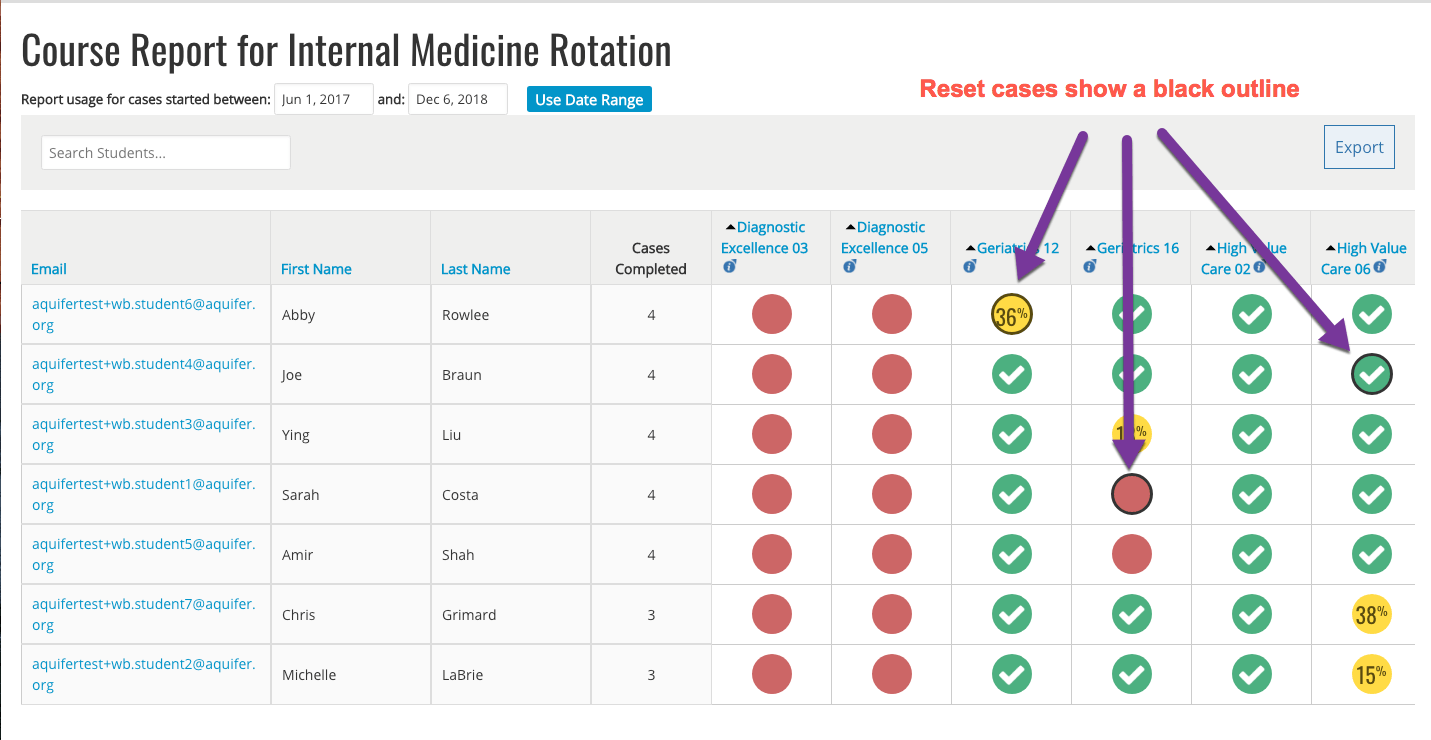
1. Go to Aquifer.org and click Sign In in the top right corner. This will take you to Aqueduct, our learning management system.

2. Enter your institutional email address in the Email box. Then click on the Register button at the bottom of the page. If you receive a prompt on the screen stating “Please ensure you are using your institutional email. If registration issue persists, please contact your clerkship coordinator.” you may be using the wrong email address, or your email may not have been rostered in the system by the administrators at your program. Try to register again using your official institutional email. If you are not successful you will need to contact your course director and ask to have your email added to the system.
Note: If you have previously registered, you will receive a notification that you have already signed in and you will be re-directed to the sign-in screen.

3. You will be sent an email with a link to complete registration. Upon receipt of the registration email, click on the link “Click Here“. You will then be brought to the profile setup page.
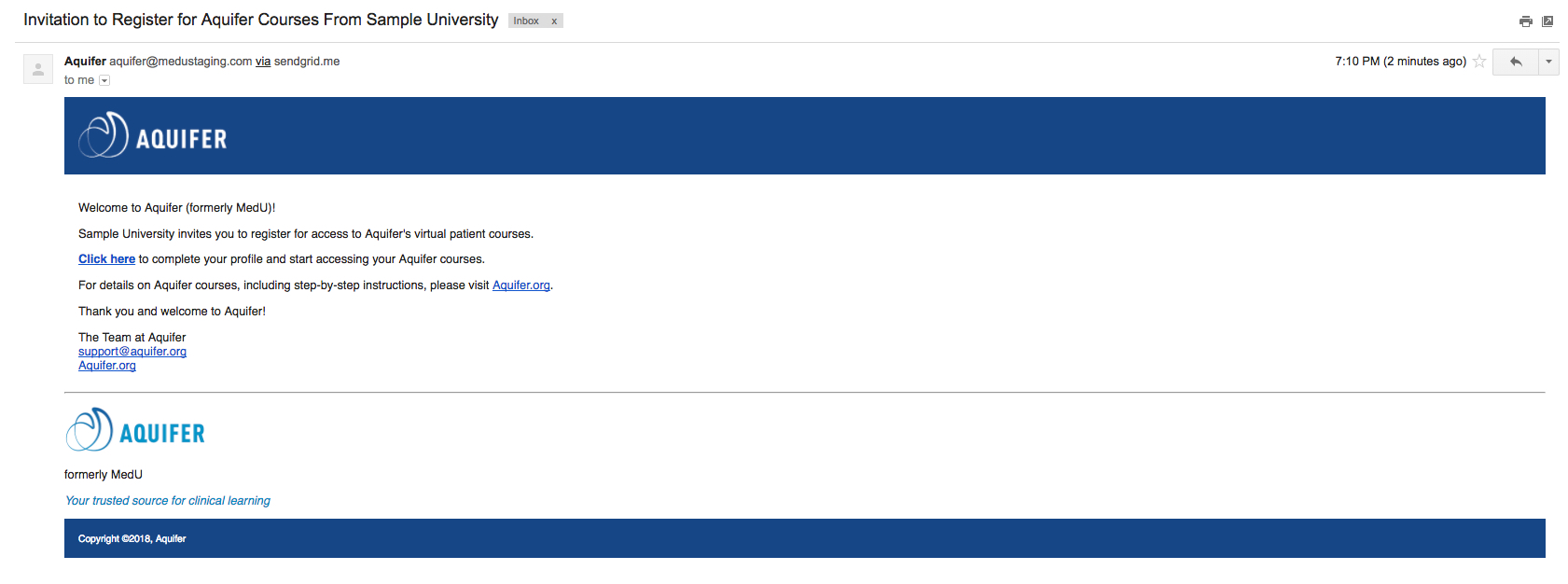
4. You will be asked to fill in your profile information and set up a password (8 character minimum).Once you have completed your user profile and created a password, you will receive a welcome email with links to useful information and guides. You would also be logged into the Aqueduct learning management system.
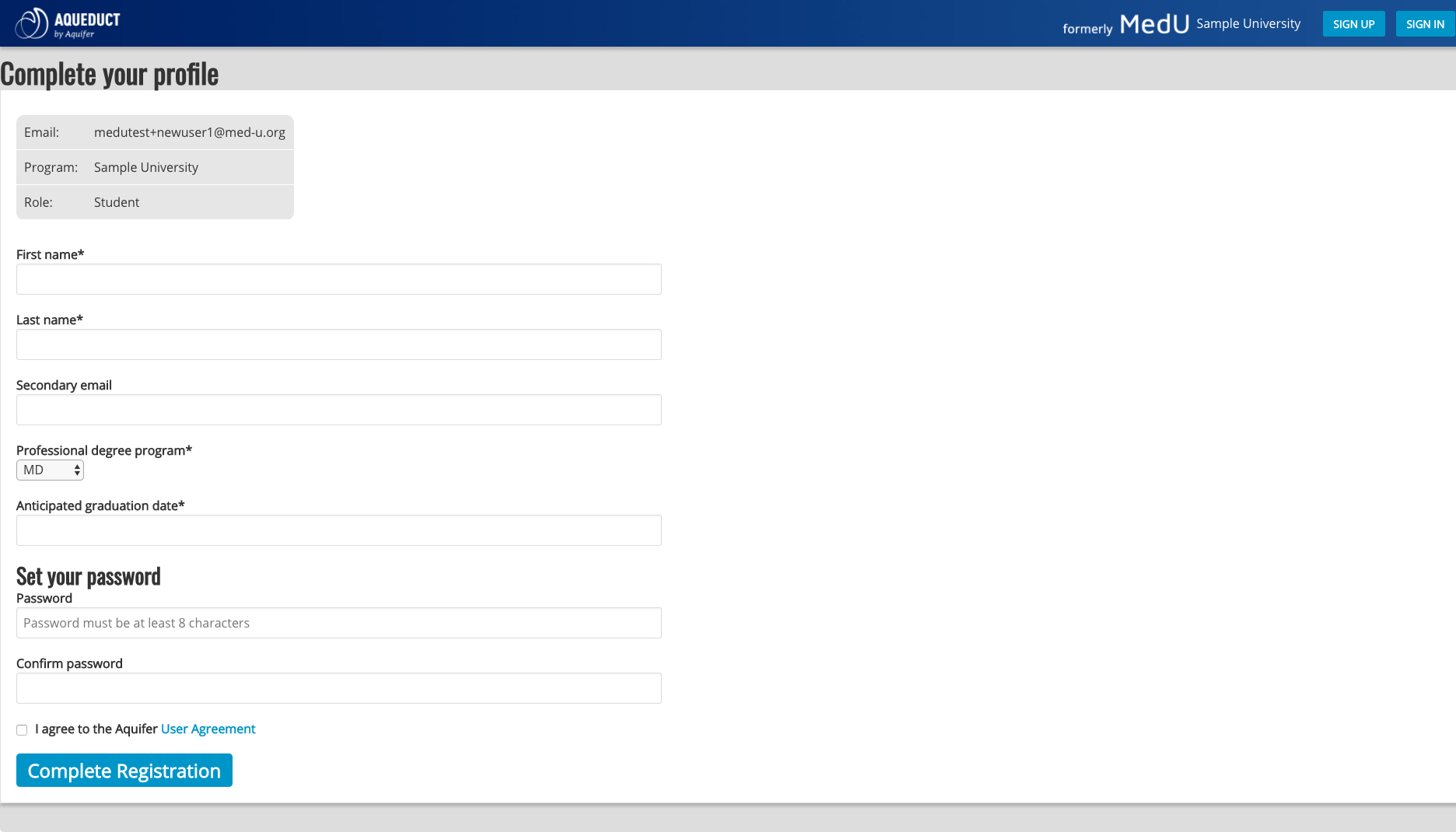
1. Once you have completed your user profile and created a password, your sign in will be quick and easy. Go to Aquifer.org and click Sign In in the top right corner.

2. You will then be brought to the Aqueduct sign in page. Please log in with your institutional email and account password and click “Sign In”.

3. Once your profile is completed successfully, you will be brought to your institution’s Course page.
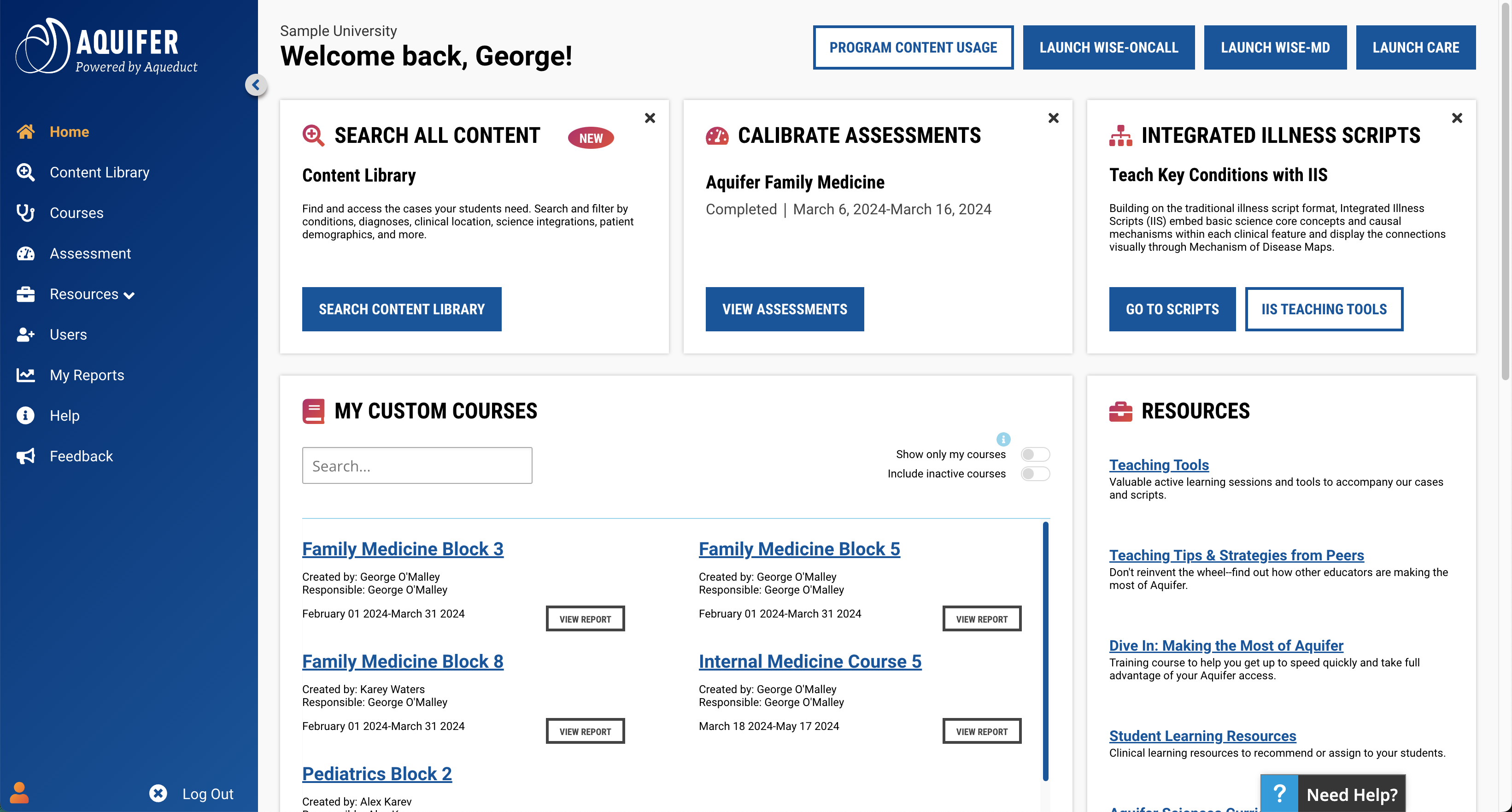
Now your sign in will be quick and easy. Go to Aquifer.org and click Sign In in the top right corner, then enter your institutional email and password.
Note: The Key Features Exam is now known as the Clinical Decision-Making Exam (as of March 15, 2019). The exam is unchanged from what is described below, with the exception of the new moniker.
Aquifer is excited to share the publication of an important validation study of our own Key Features Exam (KFE) for Internal Medicine in Academic Medicine: Journal of the Association of American Medical Colleges. The article, Validity Evidence for a Brief Online Key Features Examination in the Internal Medicine Clerkship, presents a range of evidence supporting the use of the Key Features Exam as a complementary assessment during the third-year internal medicine clerkship, specifically to test clinical decision-making skills. This publication is the result of a multi-institutional validation study led by Valerie Lang, MD, MHPE, Aquifer Academic Director for Assessment, and a team that included Aquifer Educators Consortium members Dr. Kirk Bronander and Dr. Heather Harrell.
The study results show strong evidence for response-process and relationship-to-other-variables validity for using a Key Features Exam to complement other assessments in U.S. internal medicine clerkships. Results also revealed moderate internal structure validity. The study concludes that Aquifer’s nationally developed KFE is well suited as a standardized complement to other assessments in this context.
Although Key Features Exams are widely used internationally, Aquifer’s KFE is the first designed for use in U.S. medical schools. The key features approach focuses on the critical or challenging decisions in the diagnosis and management of a clinical problem to better target critical decision points. Key features exam structure includes a case vignette, followed by several questions specifically targeting the key clinical decisions.The Aquifer Key Features Exam aligns directly with CDIM’s national curriculum as well as the Aquifer Internal Medicine course, and it is specifically designed to test clinical decision-making skills at the end of the internal medicine clerkship. The exam launched in October 2017 and is currently offered to Aquifer Internal Medicine subscribers free of charge for the 2018-19 subscription year. To learn more about the Aquifer Key Features Exam and the key features approach, please visit our Exams and Assessment page.
After a highly competitive process, Aquifer is pleased to announce that twelve pilot schools were selected to work on Phase Two of the Aquifer Sciences Initiative. Pilot schools were chosen from a nationwide call for participation. The Aquifer Sciences Leadership team is grateful for the overwhelming interest in this project from institutions across the country and thanks to all school applicants for their excellent submissions. The choices were difficult, and the team is confident that the selected pilot school teams will be instrumental in advancing our innovative efforts to re-engineer basic science medical education.
Work is now underway at each school, with teams of clinical and basic science educators—along with senior medical students—working together to create Virtual Patient Cases and Integrated Illness Scripts for clinical conditions routinely encountered in core clinical rotations.
Congratulations to the Phase Two Pilot School Program Teams:
Case Authoring Schools:
Integrated Illness Script Authoring Schools:
The Aquifer Sciences Initiative aims to provide healthcare education programs with the teaching and learning resources they need to ensure all graduates seamlessly acquire and apply basic science foundational understanding to patient care. The new tools will promote cognitive integration and allow students to self-assess and grow their foundational understanding through safe practice in making clinical decisions.
The Phase Two work leverages Aquifer’s unique pedagogy and learning objectives drawn from Phase One of the Aquifer Sciences Initiative: the recently released Aquifer Sciences curriculum and database, which was developed in collaboration with the International Association of Medical Science Educators (IAMSE) and is open and available to anyone in the medical education community. Virtual Patient Cases and Integrated Illness Scripts authoring completion is targeted for the Summer of 2019, with beta-testing to follow. Aquifer is grateful for the hard work of all of our contributors on this project and looks forward to making these important new teaching and learning tools available.
Aquifer launched several Aqueduct upgrades on November 18. The latest round of updates improves our report content, provides key details on case updates, and seeks to gain student feedback on their case experiences.
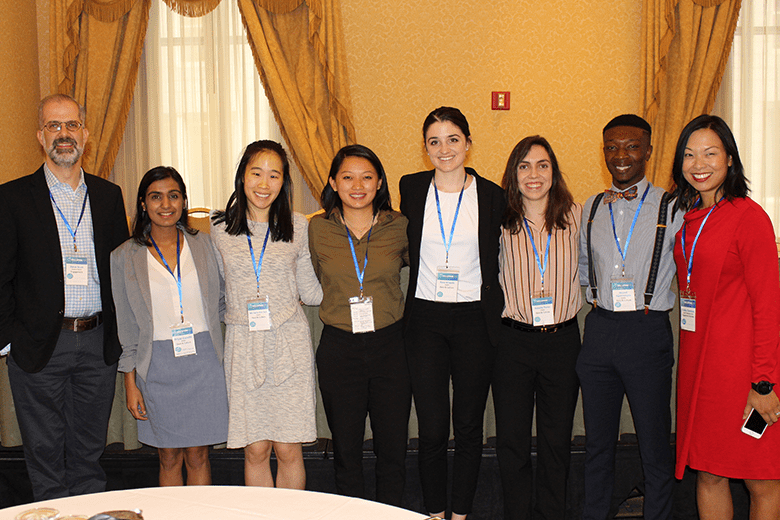
In the first phase of the project, project leads, Dr. Steve Scott and Dr. Katherine Chretien, recruited fourth-year medical students from schools across the country to form a faculty/student workgroup. The group performed a literature review and analyzed Aquifer cases for key areas of improvement. Based on this analysis, a structured guide was created to assist in the review of Aquifer cases while also providing education and rationale.
This work has now been presented nationally at the Association of American Medical Colleges Learn Serve Lead meeting (Austin, TX, November 2018).
Additional presentations have been accepted for the 2019 National Meetings of STFM, COMSEP, and AAIM/CDIM.
Academic Medicine has published ahead of print (print expected in April 2019) an article highlighting the work completed on Phase One of this project.
The two students who played critical roles in the project, Molly Rabinowitz (former student at Oregon Health Sciences University, now a pediatrics resident at Kaiser Oakland) and Aparna Krishnan (MS4 at Johns Hopkins School of Medicine) are co-first authors on the manuscript.
In May 2018, Aquifer accepted applications from first-year medical students to participate in the second phase of the project in which six students reviewed four of Aquifer’s courses (Family Medicine, Geriatrics, Internal Medicine, and Pediatrics) using the race and culture guide and made recommendations to case editors and reviewers for improving cases.
The six students presented their work and findings at the Aquifer Annual Meeting in Boston, Massachusetts, in the first week of October. They also presented their recommendations to each course board, which resulted in important and engaging conversations between the students and Aquifer’s team of educators.
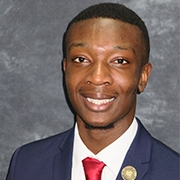
Aquifer is will be at AAMC’s Annual Meeting in Austin, Texas on November 2-6, 2018. We are looking forward to connecting with you at this year’s conference to share the latest news and help ensure that you are making the most of your subscription.
Stop by the booth to be sure you’re taking advantage of:
Where: Exhibition Hall—Booth 602
When: Saturday (4:30m-7pm), Sunday (10am-5pm), Monday (10am-1:30pm).
Can’t make it during booth hours? Not going to AAMC? Contact us to set up a personal meeting.
Aquifer is proud to note that Aquifer Consortium members Stephen Scott, MD, MPH and Katherine Chretien, MD will be presenting the work of the Aquifer Student Engagement: Race and Culture Project at AAMC as part of the following session:
Saturday, November 3, 10:30am-11:45am
Convention Center 18
Session includes presentations and discussion on three topics, including:
Addressing Structural Inequality in Medical Education: Guidelines for Virtual Patient Case Curricula
The following presentation will include research findings on integrating the Aquifer Diagnostic Excellence cases into 2nd and 3rd year medical student courses, presented by Frank Lefevre, MD:
Monday, November 5, 1:15pm-2:30pm
Convention Center 9
Session includes presentations and discussion on four topics, including:
Teaching Diagnostic Error: A Qualitative Analysis of Student Reactions to Simulated Cases

Aquifer is proud to announce that Dr. Mandi Sehgal, Teaching and Learning Lead for Aquifer Geriatrics, was elected to serve as the Teachers’ Section Chair for the American Geriatrics Society (AGS). The Teachers’ Section represents a group of interprofessional geriatrics educators who come together to encourage networking and collaboration. The section meets at the AGS Annual Scientific Meeting each year.
“I am excited and humbled by this honor,” Dr. Sehgal said. “The chair has the unique and exciting opportunity to lead wonderful colleagues and influence strategy for education sessions at the annual meeting,” she said. “My main goal during my term is to encourage and foster a sense of community among geriatric clinician educators through the use of online and social media.”
Dr. Mandi Sehgal is a Board Certified Family Medicine Physician and Geriatrician. She is an Associate Professor at Florida Atlantic University Charles E. Schmidt College of Medicine. Her roles at the College of Medicine include directing the longitudinal geriatrics curriculum thread throughout all four years of medical school, co-directing the clinical clerkship in geriatrics and palliative care, and serving as the faculty advisor to the FAU chapter of the American Geriatrics Society Geriatric Medicine Student Interest Group.
Dr. Sehgal has an academic passion for designing, implementing and evaluating geriatrics-focused educational curriculum for all learners. She is an active member of the Aquifer Geriatrics (formerly web-GEM’s) course board, currently serving as Teaching and Learning Lead, and a case co-author.
All of us at Aquifer congratulate Mandi this important national position.
Aquifer (formerly MedU) is a thriving, collaborative community of healthcare education leaders deeply committed to driving innovation in teaching and learning. The Aquifer Consortium brings together more than 200 healthcare educators across disciplines to collaborate, innovate, and make advances in health professions education. For educators and healthcare providers, participation in the Consortium offers a unique cross-disciplinary peer community and an exciting opportunity for academic scholarship and advancement.
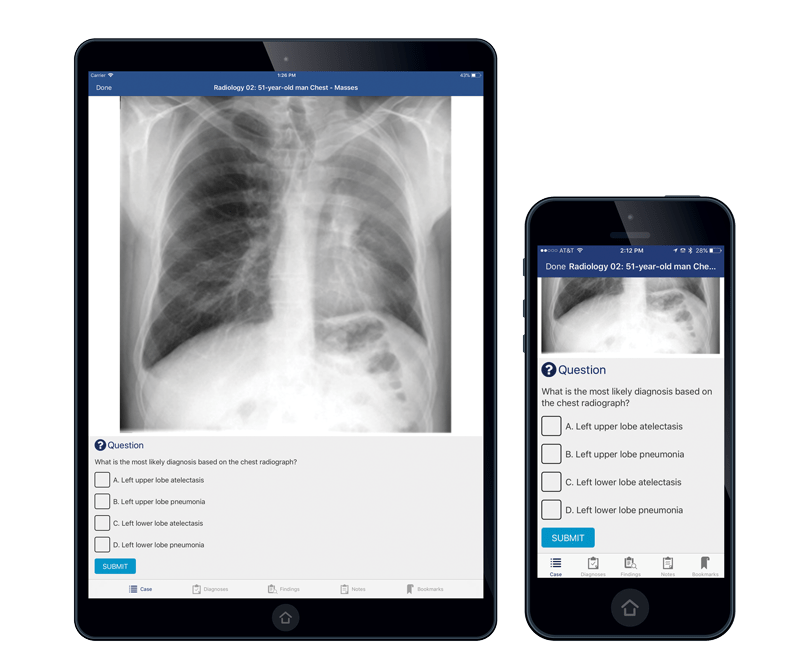
Aquifer is excited to announce that our iOS app, powered by AqueductSM is now available for free download from the App Store. Students can now complete their cases easily from an iPhone or iPad device—anytime, anywhere.
Work Offline! Download cases in advance and complete work even without an internet connection. Case work will sync to individual Aquifer accounts when devices reconnect to the internet. Once a device has synced, progress can be viewed in student and course reports on your laptop or desktop computer.
A few notes:
To download the app, click on the button below, or search “Aquifer Clinical Learning” in the App Store.
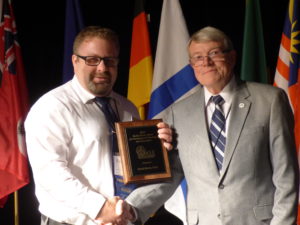
Aquifer is pleased to announce that David Harris, PhD, received the Early Career Award for Excellence in Teaching and Innovation at the 2018 International Association of Medical Science Educators (IAMSE) Annual Meeting in early June. Dr. Harris is a science lead on the Aquifer Sciences Leadership Team.
The IAMSE Early Career Award for Excellence in Teaching and Innovation honors an IAMSE member who has made significant innovations to the field in a short time toward teaching, learning, and assessment. The award is given to candidates with a record of innovation in teaching and engagement within IAMSE. The award winner is chosen by the Educational Scholarship Committee and approved by the IAMSE Board of Directors.
Dr. Harris is an Associate Professor of Physiology at the University of Central Florida. He received his PhD in physiology from the Temple University School of Medicine and later served as the course director of medical physiology at Drexel University College of Medicine. After moving to the University of Central Florida, Dr. Harris developed his scholarly interests in active learning pedagogies and the use of high fidelity patient simulation with pre-clerkship medical students. In addition to his work with Aquifer Sciences, he serves on committees of the American Physiology Society and is an Associate Editor of Advances. He is the winner of numerous awards, including the APS New Investigator Award, the APS Teaching Career Enhancement Award, and the UCF Pre-Clinical Innovative Teaching Award.
David Harris joined the Aquifer Sciences Initiative at its inception, co-leading the development efforts for Physiology concepts and learning objectives. In 2017, David joined the Initiative’s leadership team and was instrumental in re-organizing the project’s focus around body systems and seeing the Physiology concepts to completion. The success of this critical component of the curriculum could not have been achieved without David’s strong leadership of this student-driven team. “All of us at Aquifer, and especially the Aquifer Sciences team, were thrilled to see David honored at IAMSE this year. He is an integral part of this project and a talented educator. We look forward continuing to work closely with David as the next phase of the project moves ahead,” said Leslie Fall, Aquifer Executive Director and Aquifer Sciences Design/Faulty Development Lead.
Aquifer (formerly MedU) is a thriving, collaborative community of healthcare education leaders deeply committed to driving innovation in teaching and learning. The Aquifer Consortium brings together more than 200 healthcare educators across disciplines to collaborate, innovate, and make advances in health professions education. For educators and healthcare providers, participation in the Consortium offers a unique cross-disciplinary peer community and an exciting opportunity for academic scholarship and advancement.
A survey conducted by the Clerkship Directors in Internal Medicine reveals a disparity between the perceived importance of teaching in high-value care (HVC) and current state of instruction on the topic in internal medicine clerkships. The research findings were presented in “Current and Optimal Training in High-Value Care in the Internal Medicine Clerkship: A National Curricular Needs Assessment”, published in the March 2018 issue of Academic Medicine, by doctors Danelle Cayea, Kimberly Taraglia, Amit Pahwa, Heather Harrell, Amy Shaheen, and Valerie J. Lang.
The study shows that high-value care (HVC) is insufficiently taught and assessed in medical school due to several factors. As part of CDIM’s 2014 annual survey, 121 U.S. and Canadian medical school clerkship directors were asked a series of questions about the importance of high-value care instruction. The majority of respondents (91.4%) agreed that medical schools have a responsibility to teach about HVC, yet only 32.9% reported that their curricula included formal instruction on this topic. A majority of clerkship directors found the amount of instruction dedicated to HVC was insufficient (70.2%).
Survey results show that lack of dedicated time in the curriculum (73.4%) and lack of faculty time to teach (68.1%) are the top barriers to implementing HVC instruction. Other contributing factors included lack of curricular materials, faculty development, and dedicated curricular time. The study cites that curricular teaching tools, including Aquifer High Value Care, are currently available and would benefit from further dissemination.
Originally developed by expert members of CDIM and adopted from the ACP and AAIM HVC resident curriculum, the Aquifer High Value Care virtual patient cases model best-practices in high-value care. The original content recently expanded to 12 cases, which include the pediatric population and specialties outside of internal medicine. All are available free of change. Dr. Heather Harrell, study co-author and Aquifer High Value Care Senior Director noted. “The Aquifer High Value Care curriculum is uniquely suited to help address this gap and perceived barriers to HVC education in U.S. medical schools. With very little faculty time required, educators can assign the entire course, or just a selection of cases depending on the needs of their program.”
Aquifer Consortium members Dr. Amit Pahwa, Dr. Heather Harrell, and Dr. Valerie Lang participated as co-authors in the study. Dr. Amit Pahwa is an Associate Director of the Aquifer High Value Care Course Board, an Assistant Professor of Medicine, and Director of Hospital Medicine Sub-Internship at Johns Hopkins University School of Medicine. Dr. Heather Harrell is the Senior Director of Aquifer High Value Care Course Board, a Professor of Medicine and Co-Director of Internal Medicine Clerkship at the University of Florida, Gainesville, and former CDIM President (2012-2013). Dr. Valerie Lang is the Aquifer Academic Director for Assessment, an Associate Professor of Medicine at the University of Rochester, and former CDIM President (2014-2015).
Aquifer (formerly MedU) is a thriving, collaborative community of healthcare education leaders deeply committed to driving innovation in teaching and learning. The Aquifer Consortium brings together more than 200 healthcare educators across disciplines to collaborate, innovate, and make advances in health professions education. For educators and healthcare providers, participation in the Consortium offers a unique cross-disciplinary peer community and an exciting opportunity for academic scholarship and advancement.
Aquifer courses and assessments have been updated to reflect the most up-to-date guidelines and protocols. All updates take effect on July 1, 2018. The Aquifer Consortium, a group of more than 200 health care educators and experts dedicated to helping Aquifer provide the best curricular content available, reviewed and updated the cases as part of Aquifer’s Continuous Course Improvement Process.
Aquifer’s Continuous Course Improvement Process involves ongoing updates and peer-review to ensure that our educators and students have access to the most up-to-date and informative content. Over 100 cases have been updated for the 2018-19 subscription year. The updates bring our cases, assessments, and resources in line with current and ever-changing guidelines and recommendations for screening, care, and prescribing for:
In addition, the Aquifer Internal Medicine course now includes new Self-Assessment Questions for all cases. Self-assessment questions at the end of each case allow students to calibrate their ability to apply their new knowledge and skills by completing five single-best answer vignette-style questions. The questions have been written and rigorously peer-reviewed by members of the Clerkship Directors in Internal Medicine (CDIM), and are tightly linked to the learning objectives of the CDIM – Society for General Internal Medicine (SGIM) Core Medicine Clerkship Curriculum.
New questions have also been added to the Aquifer Radiology Exam, which will be added to our existing questions through a carefully maintained validation process this year.

Aquifer congratulates our own Amit Shah, MD, FACP, AGSF, of the Aquifer Geriatrics Course Board, on being chosen as American Geriatrics Society Outstanding Mid-Career Clinician Educator of the Year Award. Dr. Shah was chosen as this year’s winner for his work as an inspiring mentor, attentive clinician, and innovative development of web-GEMs (now Aquifer Geriatrics).
The Outstanding Mid-Career Clinician Educator of the Year award is given by the American Geriatrics Society to a junior faculty member for an impressive body of work in geriatrics education, with significant contributions to training students and advancing geriatrics education. The award was presented on May 4 at the AGS National Scientific Meeting in Orlando, Florida.
Dr. Shah led the development of web-GEMs (now Aquifer Geriatrics), and served as the co-Primary Investigator of the Reynolds grant which created the course. He continues the work of providing high-quality virtual patient cases to geriatrics learners as an Associate Editor for the Aquifer Geriatrics Course Board.
Currently, Dr. Shah leads the longitudinal geriatrics curriculum and co-directs the internal medicine residency continuity clinic as an Assistant Professor of Medicine and Associate Dean for Faculty Affairs at the Mayo Clinic School of Medicine in Arizona. Previously, Dr. Shah was the Clerkship Director for Internal Medicine at the University of Texas Southwestern Medical school, where he worked to integrate geriatrics into the curriculum. During his time in Texas, he also helped to facilitate the Southwestern Aging and Geriatrics (SAGE) program, was elected to the UT Southwestern Academy of Teachers, and received a number of teaching awards.
Aquifer (formerly MedU) is a thriving, collaborative community of healthcare education leaders deeply committed to driving innovation in teaching and learning. The Aquifer Consortium brings together more than 200 healthcare educators across disciplines to collaborate, innovate, and make advances in health professions education. For educators and healthcare providers, participation in the Consortium offers a unique cross-disciplinary peer community and an exciting opportunity for academic scholarship and advancement.
Aquifer launched Aqueduct, our new learning management system, in June 2017. Since then, our team has been working to improve the user experience of the platform, optimize existing functionality, and add newly requested features.
We want you—our users—to have the best possible experience.
We would like to highlight some of the work we’ve completed, and share some of the projects our development team is working on for future releases.
We hope you’ve seen our latest improvements, including new reporting functionalities, performance enhancements, sign-in process upgrades, and more:
We’ve added features to simplify how you view, add, and remove users from your program.
As we look to the future, we’re focused on improving your user experience even more and adding the features you want, including:
Note: The updates above will apply to all Aquifer courses. WISE-OnCall and WISE-MD are distributed by Aquifer on behalf of the NYU School of Medicine and are available on the WISE platform, accessed from your Aquifer account.
Aquifer congratulates Colin M. Sox, MD, MS on the recent publication of his study “Efficacy of a Web-Based Oral Case Presentation Instructional Module: Multicenter Randomized Controlled Trial”, in the January 2018 issue of Academic Pediatrics. His research tested the effectiveness of the Aquifer Oral Presentation Skills course (formerly CLIPP oral case presentation modules) in improving student’s oral presentation skills, as compared to a faculty-led feedback session or no additional training.
Dr. Sox asserts that this makes the Aquifer Oral Presentation Skills course “arguably a more efficient educational tool… it provides a flexible, independent learning opportunity that requires no faculty time.” The study also concluded that a student’s previous experience in an Internal Medicine clerkship was predictive of higher quality oral presentations. Dr. Sox’s study was funded by the MedU CLIPP Small Grant and the Joel and Barbara Alpert Endowment for the Children of the City and took place between July 1, 2013, and June 30, 2015.
Dr. Sox is an Assistant Professor of Pediatrics at Boston University School of Medicine. He earned his MD at Harvard Medical School, where he also began his research work. After completing his Pediatrics residency training at the University of California, San Francisco, he earned an M.S. in Health Services Research at the University of Washington as an RWF Clinical Scholar. While working on the faculty of Harvard Medical School and Boston University School of Medicine over the last 16 years, Dr. Sox’s research has continued, with a focus on medical education. He received the Academic Pediatric Association’s Ray E. Helfer Award for Innovation in Pediatric Education and currently, is conducting a randomized control test of a mindfulness curriculum in 15 US pediatric residency programs to test the impact of the curriculum on physician burnout.
View the abstract and access the full article.
Aquifer (formerly known as MedU) is a mission-driven 501 (c)(3) non-profit organization dedicated to delivering the best healthcare education through collaborative development and research into innovative, high-impact virtual teaching and learning methods. Aquifer develops trusted, award-winning, virtual case-based courses derived from national healthcare curricula. Since Aquifer’s founding in 2006, over 10,000,000 virtual cases have been completed by more than 300,000 students. Aquifer’s cases are created and maintained by more than 400 educators from 10 leading national organizations representing more than 120 academic institutions.

Aquifer is proud to announce that Andrew Olson, MD will receive the 2018 CDIM Early Career Medical Student Educator Award at the Clerkship Directors in Internal Medicine (CDIM) National Meeting during the Alliance for Academic Internal Medicine’s Academic Internal Medicine Week.
The CDIM Early Career Medical Student Educator Award is given to a CDIM member at the instructor or assistant professor level who demonstrates innovation and excellence in medical student education. Areas of achievement may include leadership and scholarship in medical student education, teaching, or service to CDIM or AAIM. Award nominees are reviewed by the CDIM Nominating Committee and approved by the CDIM Council.
Dr. Andrew Olson is an Assistant Professor of Medicine and Pediatrics at the University of Minnesota where he practices hospital medicine and pediatrics. He also serves as the Director of the Medical School’s Subinternship in Critical Care and as the founding Director of the Medical School’s Becoming a Doctor course. Dr. Olson was recently named the Director of Medical Educator Development and Scholarship. His areas of interest and study are in the development of expertise in decision-making, methods to improve diagnostic reasoning education and competency-based medical education.
Dr. Olson is currently serving in the Aquifer Consortium as the Senior Director for Aquifer Diagnostic Excellence. Dr. Olsen is the Primary Investigator of the DX: Diagnostic Excellence project, a national project to develop, implement, and evaluate a novel curriculum for medical students about diagnostic reasoning and error. He also is the Co-Chair of the Education Committee of the Society to Improve Diagnosis in Medicine and the co-Primary Investigator of a Macy-Foundation project to develop an Interprofessional Curriculum to Improve Diagnosis.
Aquifer (formerly MedU) is a thriving, collaborative community of healthcare education leaders deeply committed to driving innovation in teaching and learning. The Aquifer Consortium brings together more than 200 healthcare educators across disciplines to collaborate, innovate, and make advances in health professions education. For educators and healthcare providers, participation in the Consortium offers a unique cross-disciplinary peer community and an exciting opportunity for academic scholarship and advancement.
From our partners at the NYU School of Medicine:
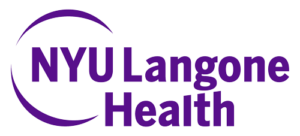
We are pleased to announce that WISE-OnCall is now available through the Aquifer system.
WISE-OnCall consists of 12 modules addressing common clinical presentations. Each module emphasizes:
Dramatizations emphasize the importance of gathering information from the medical record, nursing staff, the patient, and appropriate diagnostic tests. Professionalism, communication & escalation of acute situations is also covered. Checklists and practice questions help learners to hone their clinical reasoning skills.
The modules currently available include:
A research study of the impact of WISE-OnCall modules demonstrated improvement in our graduating students’ clinical skills when measured in a controlled simulation exercise*. Students have consistently graded WISE-OnCall very high with respect to content and appropriateness for their level of learning.
This course is designed specifically for upper-level clerkships and transition to residency courses. However, some residency programs are using WISE-OnCall for junior resident orientation.
NYU School of Medicine uses the modules to help prepare graduating students for residency. Last year our program directors required WISE-OnCall for 140 incoming interns as part of our patient safety orientation. Due to the overwhelmingly favorable response from faculty, participating residents and hospital administrators, WISE-OnCall will be a part of the orientation process for all new residents.
Please let us know if you would like to view WISE-OnCall program and consider it for your transition to residency curriculum. If you have questions or would like to know more about our use of the modules, feel free to contact Dawn Bornheimer at 646-854-8033.
Thomas S. Riles, MD
Associate Dean for Medical Education and Technology
New York University School of Medicine
*Szyld D, Uquillas K, Green BR, Yavner SD, Song H, Nick MW, Ng GM, Pusic MV, Riles TS, & Kalet A (2017). Improving the clinical skills performance of graduating medical students using “WISE OnCall,” a multimedia educational module. Simulation in Healthcare, 12(6), 385-392, 2017

Aquifer congratulates our own Katherine Chretien, MD on the recent publication of her book; Mothers in Medicine: Career, Practice, and Life Lessons Learned. Katherine is an Aquifer Consortium member and a prominent physician and medical educator, specializing in Internal Medicine.
Dr. Katherine Chretien is the Assistant Dean for Student Affairs and an Associate Professor of Medicine at George Washington University School of Medicine & Health Sciences. She is also a hospitalist physician at the Washington DC VA Medical Center. Katherine is the recipient of the Charles H. Griffith III Educational Research Award from Clerkship Directors in Internal Medicine (CDIM) and the Women Leaders in Medicine Award from the American Medical Student Association.
Dr. Chretien began working with Aquifer in 2014, when she became an Associate Editor on the Aquifer Internal Medicine Board (formerly SIMPLE). She is currently a Student Engagement Lead for the Aquifer Teaching & Learning Group, and a co-faculty lead for Aquifer’s Race and Culture pilot project. In addition to her work with the Aquifer Consortium, Katherine also serves on the editorial board of the Journal of Graduate Medical Education, and on the CDIM Council. She will be CDIM President-Elect beginning June 2018.
Mothers in Medicine: Career, Practice, and Life Lessons Learned draws from the best advice, wisdom, stories, and insights shared on the popular Mothers in Medicine blog (mothersinmedicine.com) over the last 10 years, as well as the authors’ personal experiences and expertise. The Mothers in Medicine group blog began in 2008 as a way to cultivate a community of support for women in medicine. The book covers a range of themes relating to the physician-mother: career decisions, having children during training, navigating life challenges, practice issues, and work-life balance. Mothers in Medicine, now available on Amazon and Springer.com, preserves the conversational tone of the blog and provides a guide for women in medicine at all stages of their careers.
“The entire Aquifer team is proud of Katherine’s tremendous achievement in completing this book,” said Leslie Fall, Aquifer Executive Director and Chief Academic Officer. “She’s an incredible asset to the Aquifer Consortium and a talented, dedicated physician and educator. It’s impressive—but not surprising—that she has added the publication of this book to her accomplishments.”
Aquifer (formerly MedU) is a thriving, collaborative community of healthcare education leaders deeply committed to driving innovation in teaching and learning. The Aquifer Consortium brings together more than 200 healthcare educators across disciplines to collaborate, innovate, and make advances in health professions education. For educators and healthcare providers, participation in the Consortium offers a unique cross-disciplinary peer community and an exciting opportunity for academic scholarship and advancement.
Aquifer’s teaching and learning platform, Aqueduct, is built using web standards, the program runs on Windows, Mac, Linux, iOS, Android, or any other device with a modern web browser.
Supported Operating Systems include: Windows 10 and newer; Mac OSX 10.14 Mojave and newer; Linux; ChromeOS
Mobile Operating Systems: iOS – please install our app for iOS 13 and newer; Android – Android Oreo, Oatmeal Cookie v8.1 and newer.
Computer Speed and Processor: Best experienced on a computer 5 years old or newer; 1GB of RAM; 2GHz processor
Browsers Supported: Microsoft Edge; Safari 18 and newer (Macintosh only); Chrome 116 and newer; Firefox 120 and newer
This is a critical step if your program is new to using Aquifer. Whitelisting our domains and email addresses will ensure that your faculty and students will be able to gain access to our system.
Whitelisting should be done by your program’s IT department.
Web Traffic
Email from the Aqueduct learning platform
You can update your User Profile while you are logged in. You will be able to change your First Name, Last Name, Professional Degree, Your Program Role, as well as other role specific options.
Note: Some of the profile options are only available to certain Aqueduct Roles.
1. Sign in to Aqueduct.

2. Once you are logged in, click on the Profile Icon in the bottom left corner of your screen.

3. You will then be brought to your profile administration page. Here you can update your information to make it current. Once you have updated your information, click on “Update”.

4. You will then see a notification for successfully completing your profile.

It is possible to change your password while you are logged into Aqueduct.
Note: Your new password must be 8 characters or longer. You can use a combination of uppercase, lowercase, numbers and symbols.
1. Log into Aqueduct.

2. Click on your Profile Icon in the bottom left corner of your screen.

3. You will then be brought to your profile administration page. Click on “Edit Password“.
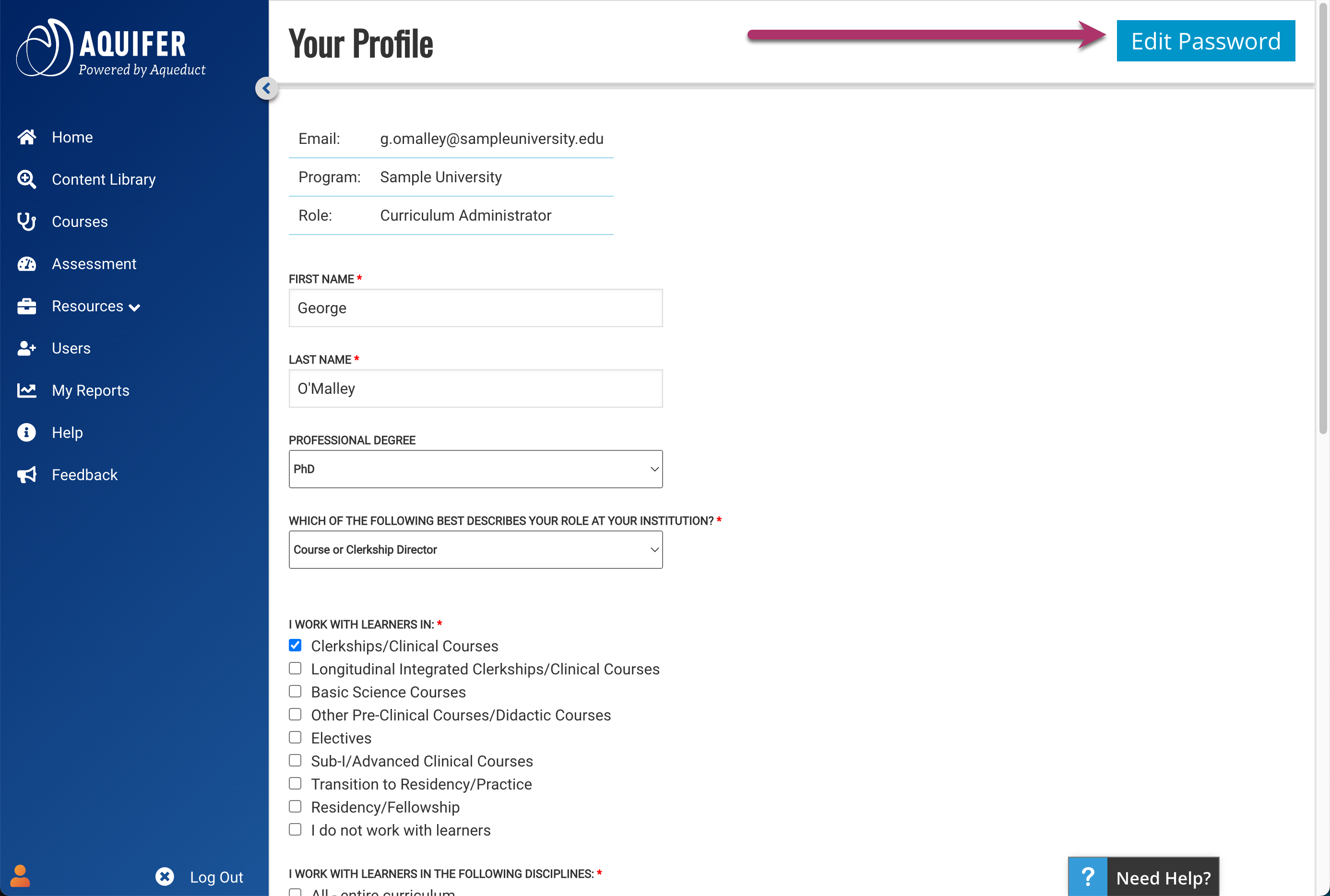
4. You will then be brought to a password update page. Put in your new password under “Password“, put your new password in a second time to confirm under “Password confirmation” and finally put your current password under “Current password“. Now click “Update” to update your password.
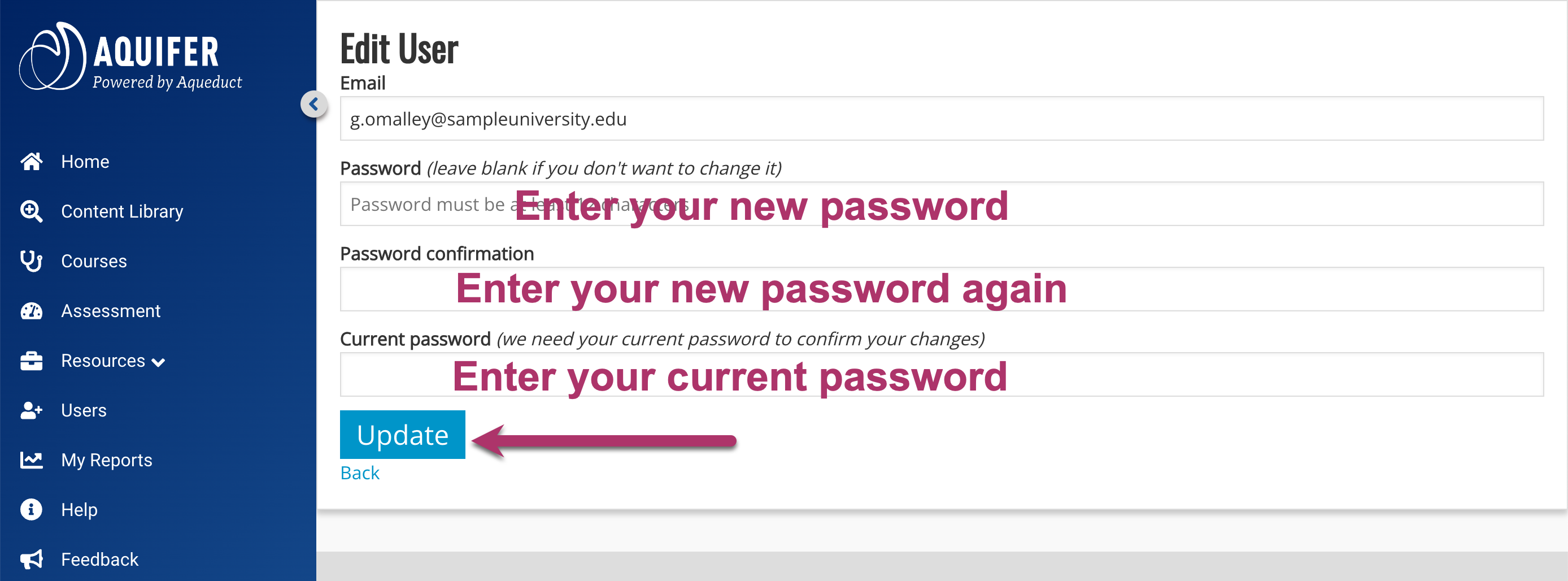
5. You will then be notified that you have successfully updated your account (password).

If you are registering for Aqueduct and you receive an “Invalid Token” error when trying to set up a new password, please try copying and pasting the link from your email into Chrome, Firefox, Internet Explorer or Edge. We currently have a bug in Safari that will give an “Invalid Token” error. We are working to get this resolved as soon as possible. If you still are having issues, please submit a ticket using the following link: Aquifer Support

1. Go to Aquifer.org and click the Sign In button.

2. You will be brought to the Aqueduct Sign In page. Put in your account email address and password. Then click Sign In.

3. On the side navigation bar, click on “Courses.”

4. You will then see blue buttons on the right to “Launch” WISE-MD, WISE-OnCall, or CARE. Click on the button for your course to access to the content in the WISE learning platform.

5. If this is your first time accessing the WISE platform, you will be brought to a verification page which will ask you to confirm your name, institution, and to select your appropriate clerkship/group/block.
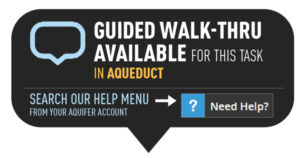
As of January 2, 2019, students may reset their own cases at any time to review Aquifer cases again in a rigorous way. Please note that individual programs or courses may have specific policies on this function. Administrators can no longer reset student cases.
A Case Reset means that:
A student may wish to reset a case to complete it again in a complete way, revealing information step-by-step as they move through the case and answering embedded assessment questions. Although the case content is available to students after case completion, the information will appear all at once (ungated) and questions will show previous answers. Resetting the case will remove all previous data, allowing students to repeat the original case experience.
Before resetting a case, be sure to download any notes that you’ve saved in Aqueduct. There are two ways to do this:
1. To reset an individual case, from the course page, simply click the “Reset” button on the case you wish to reset.
2. To reset multiple cases, click the “Progress Reset” Button in the top right hand corner of the course page.
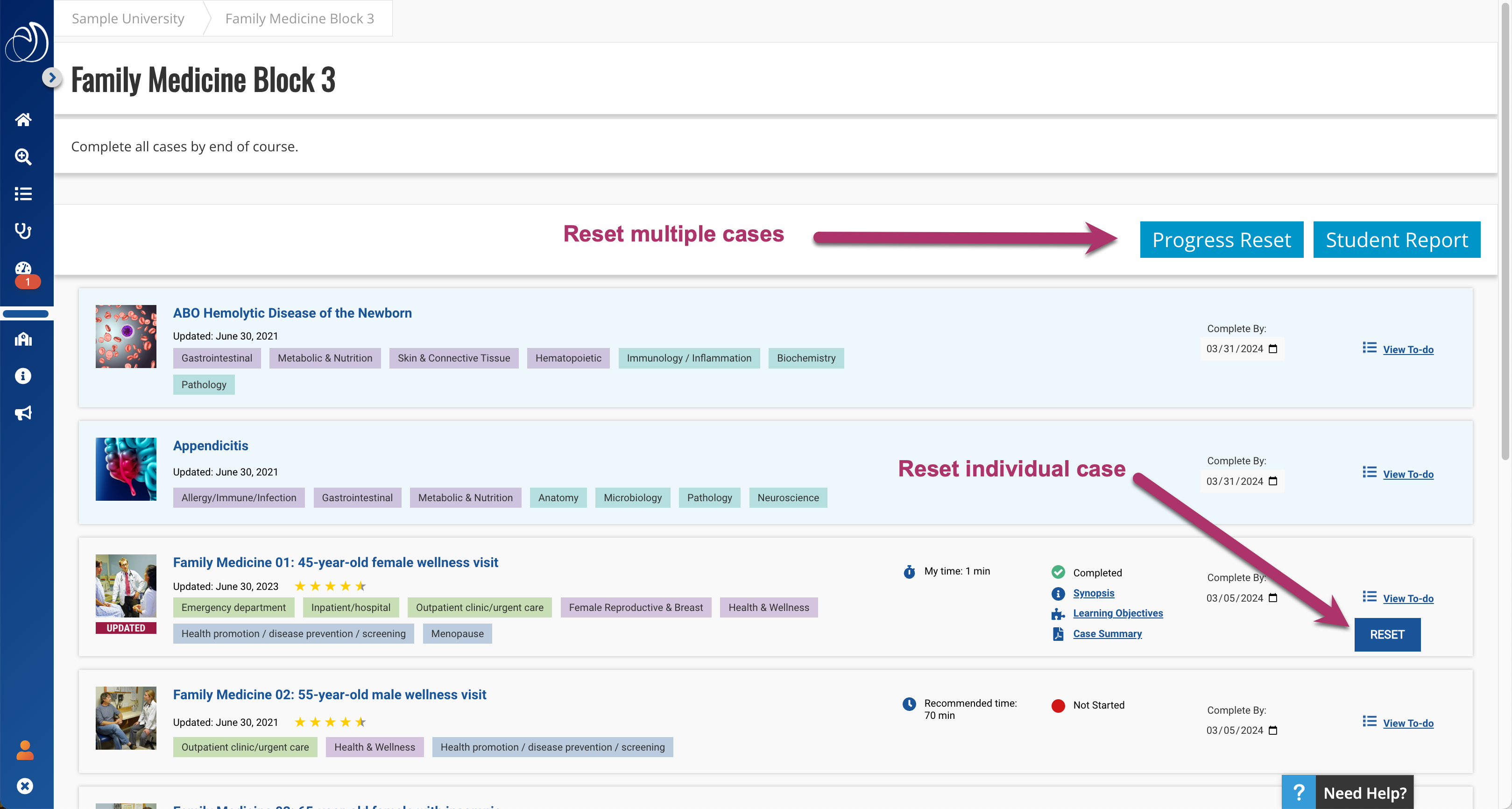
3. Select the case(s) that you wish to reset. Selected cases will show in blue. You may also use the search field for Select All or Deselect All to quickly choose your cases. Note: If you need to download your case notes, click the Download Case Notes button.
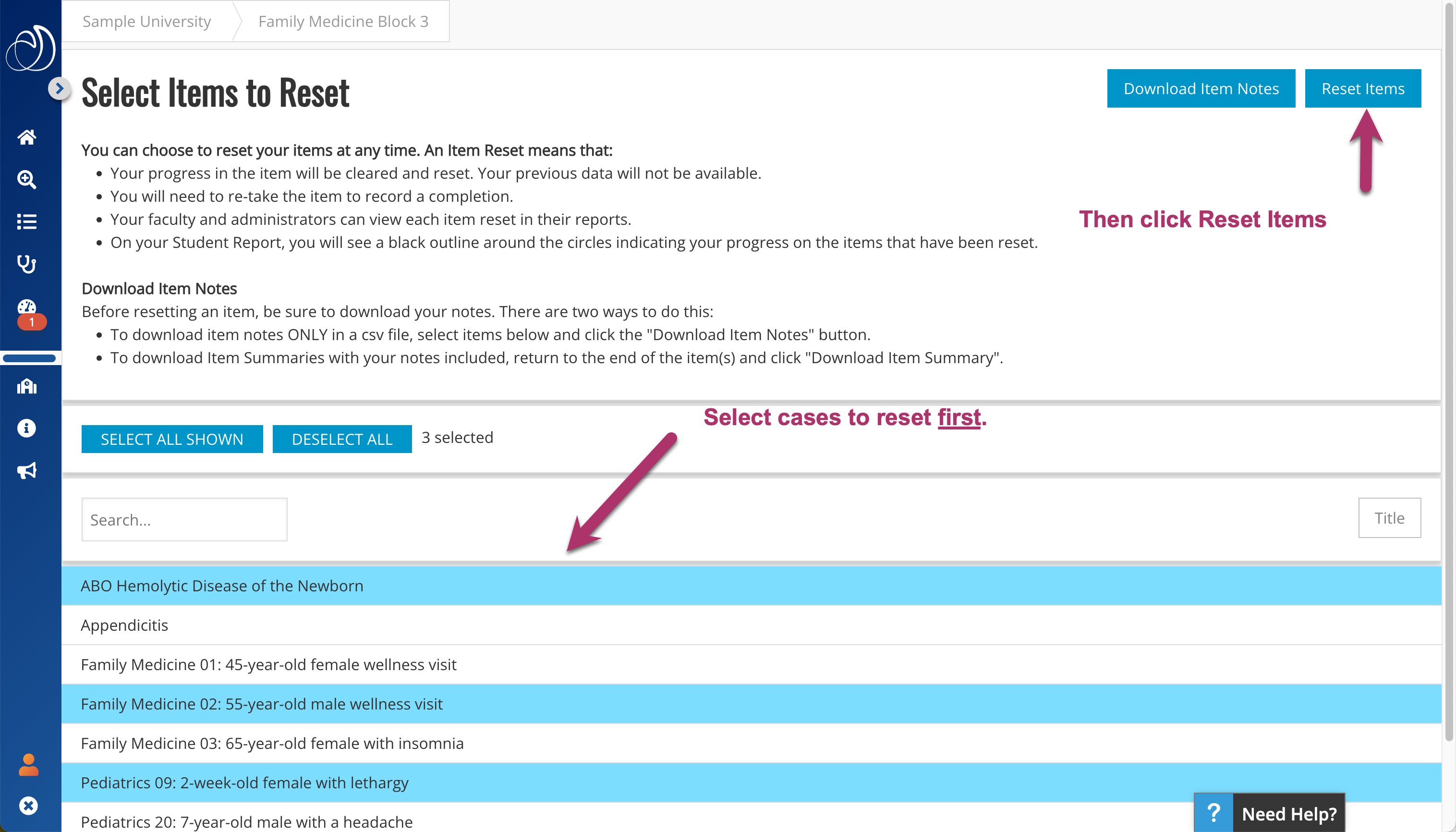
4. Click on the Reset Cases button. Two warnings will come up to ensure that you wish to continue and that you have downloaded your notes. Click OK twice to reset your cases.


5. After resetting, you will land on the course page where you will see that the progress bar for your reset cases has been updated to show 0%.
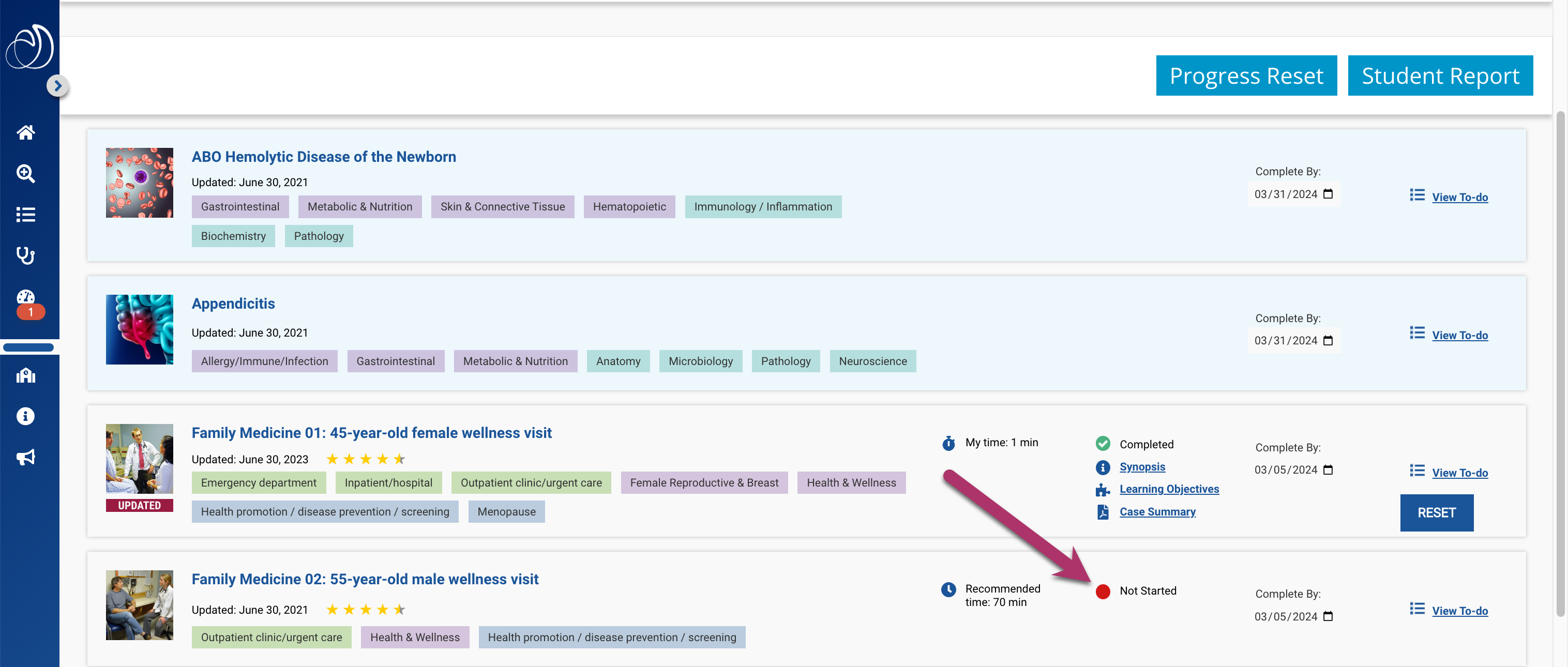
Aquifer’s new standardized case names provide consistency across all cases and provide a common language when searching for or referring to Aquifer cases.
The Aquifer case naming convention uses the following structure: Patient age, sex, and presentation. To make case names more mobile-friendly, personal names are no longer included in titles. Patients 17 years and older are referred to as “man” or “woman” and patients under 17 years are referred to as “male” or “female”.
Are you trying to find an old case name? Or are you wondering where the patient names have gone?
View our full case name crosswalk:
1. Go to Aquifer.org and click Sign In in the top right corner. This will take you to Aqueduct, our learning management system.

2. Enter your institutional email address in the Email box. Then click on the Register button at the bottom of the page. If you receive a prompt on the screen stating “Please ensure you are using your institutional email. If registration issue persists, please contact your clerkship coordinator.” you may be using the wrong email address, or your email may not have been rostered in the system by the administrators at your program. Try to register again using your official institutional email. If you are not successful you will need to contact your course director and ask to have your email added to the system.
Note: If you have previously registered, you will receive a notification that you have already signed in and you will be re-directed to the sign-in screen.

3. You will be sent an email with a link to complete registration. Upon receipt of the registration email, click on the link “Click Here“. You will then be brought to the profile setup page.

4. You will be asked to fill in your profile information and set up a password (12-character minimum). Once you have completed your user profile and created a password, you will receive a welcome email with links to useful information and guides. You would also be logged into the Aqueduct learning management system.
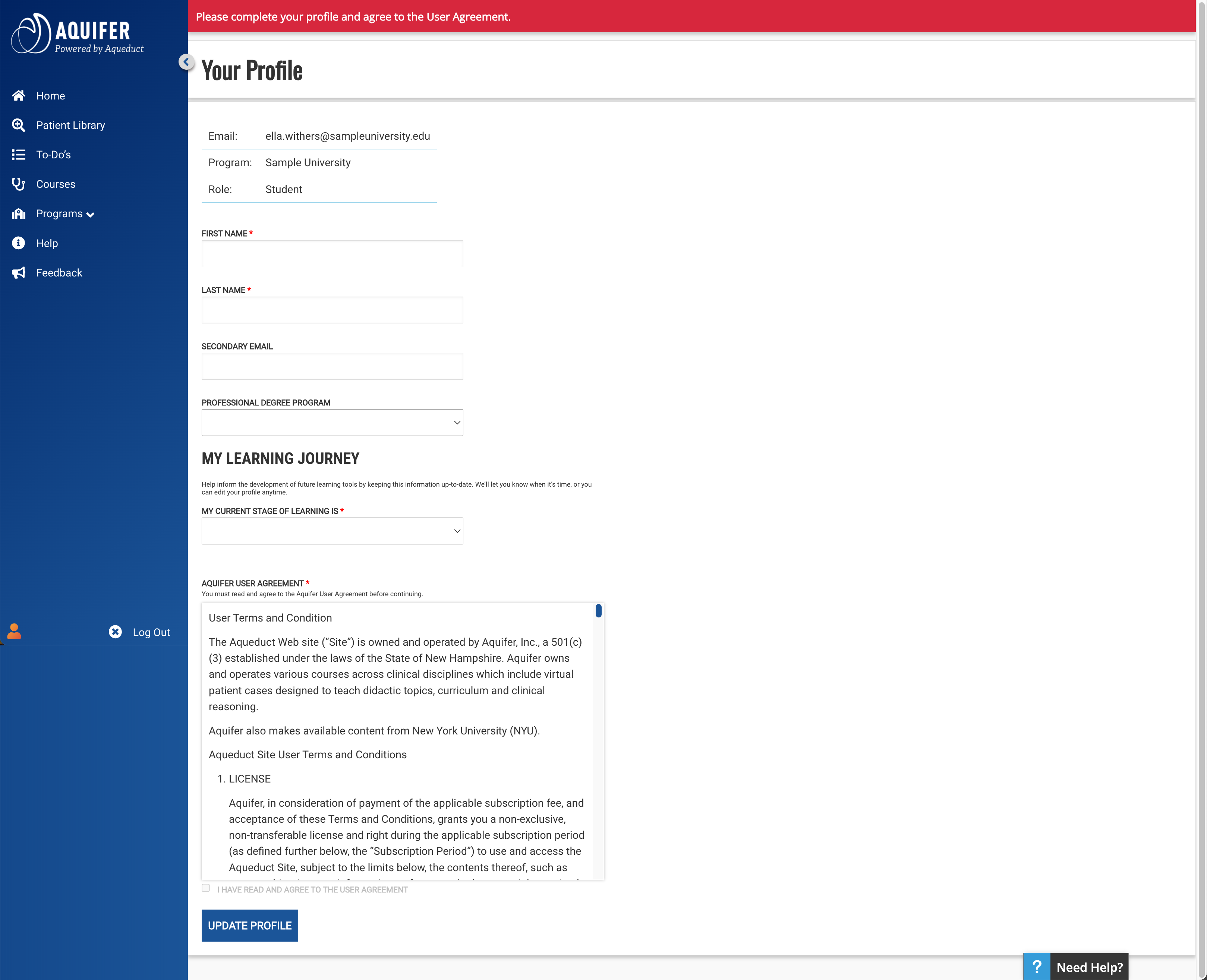
5. Once your profile is completed successfully, you will be brought to your home page.
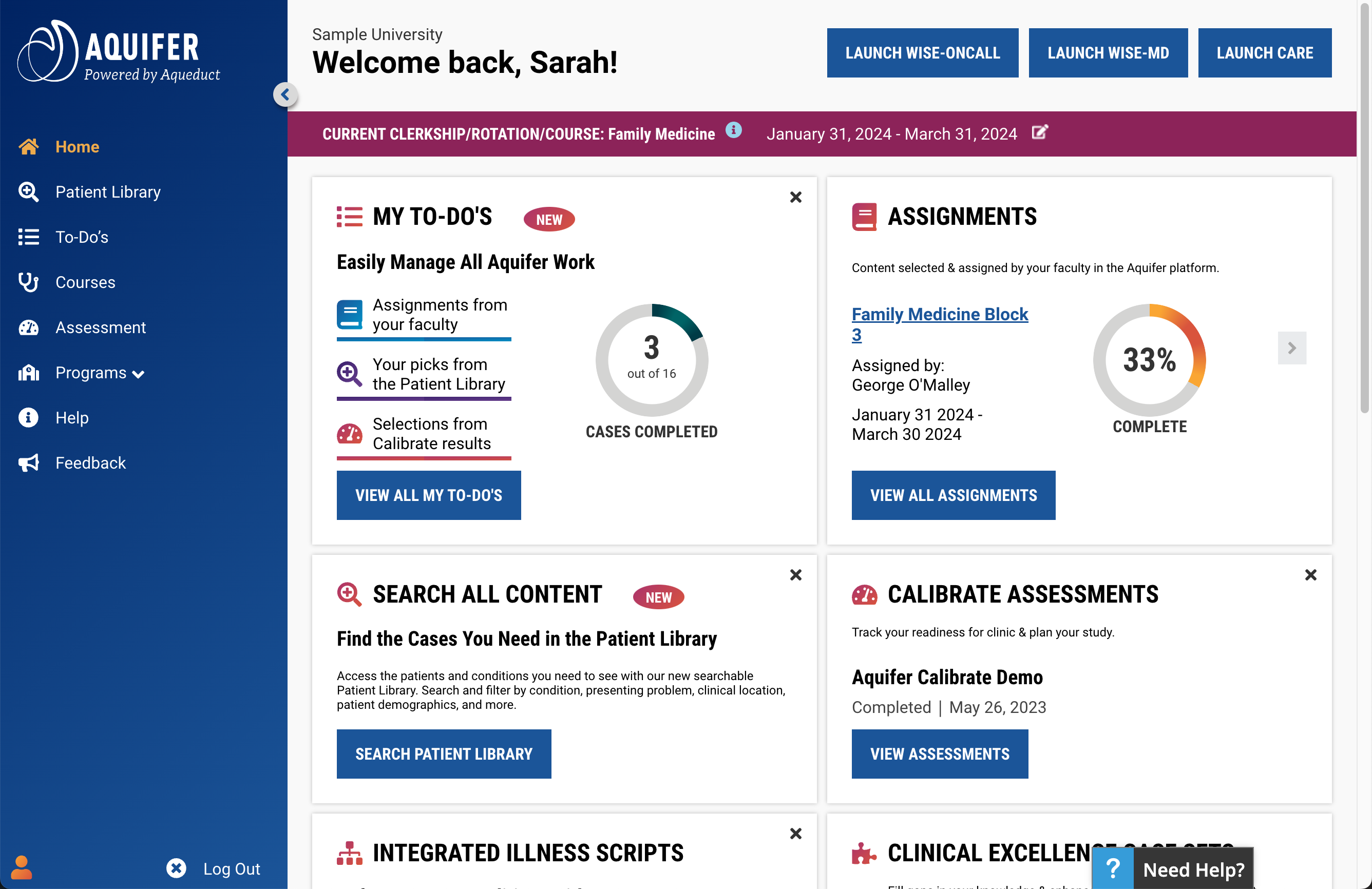
6. You will also receive a “Thank you for registering with Aquifer” email with links to tools, resources, and Aquifer news.
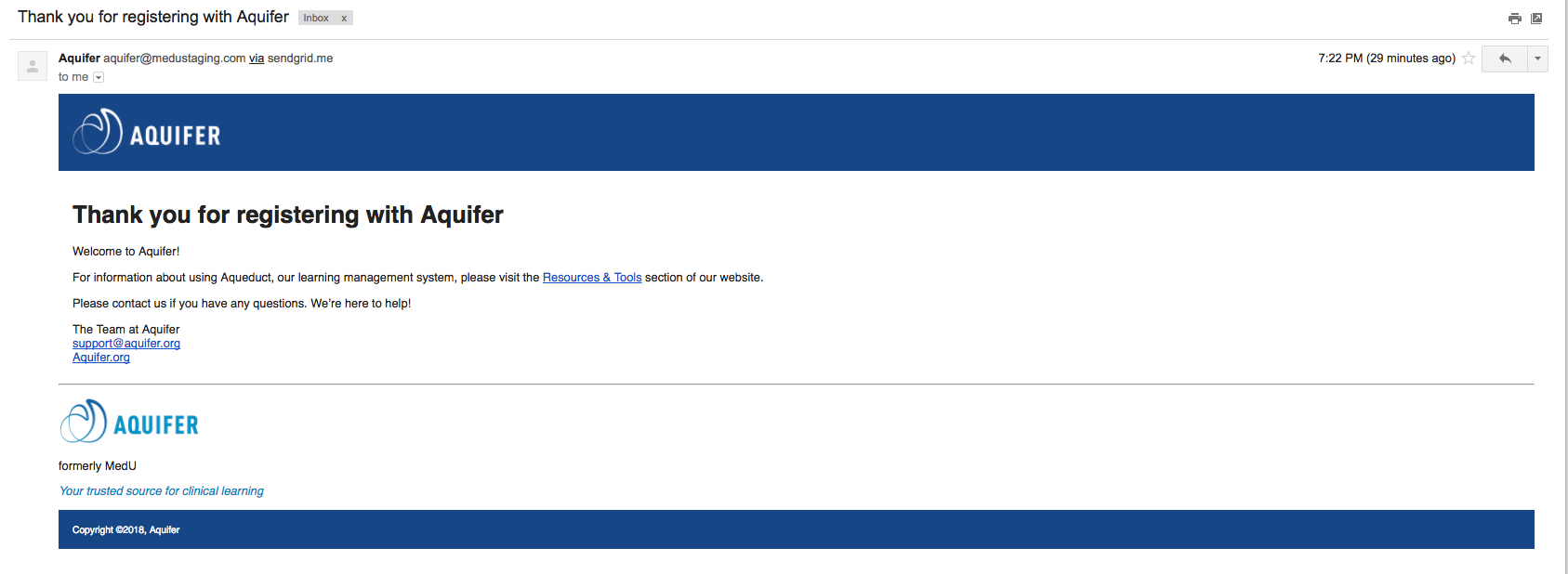
Now your sign in will be quick and easy. Go to Aquifer.org and click Sign In in the top right corner, then enter your institutional email and password.
1. Once you have completed your user profile and created a password, your sign in will be quick and easy. Go to Aquifer.org and click Sign In in the top right corner.

2. You will then be brought to the Aqueduct sign in page. Please log in with your institutional email and account password and click “Sign In”.

1. If you forget your password, Aquifer can help you regain access to your courses and information right away. From the Sign In page, click the Forgot Password link.
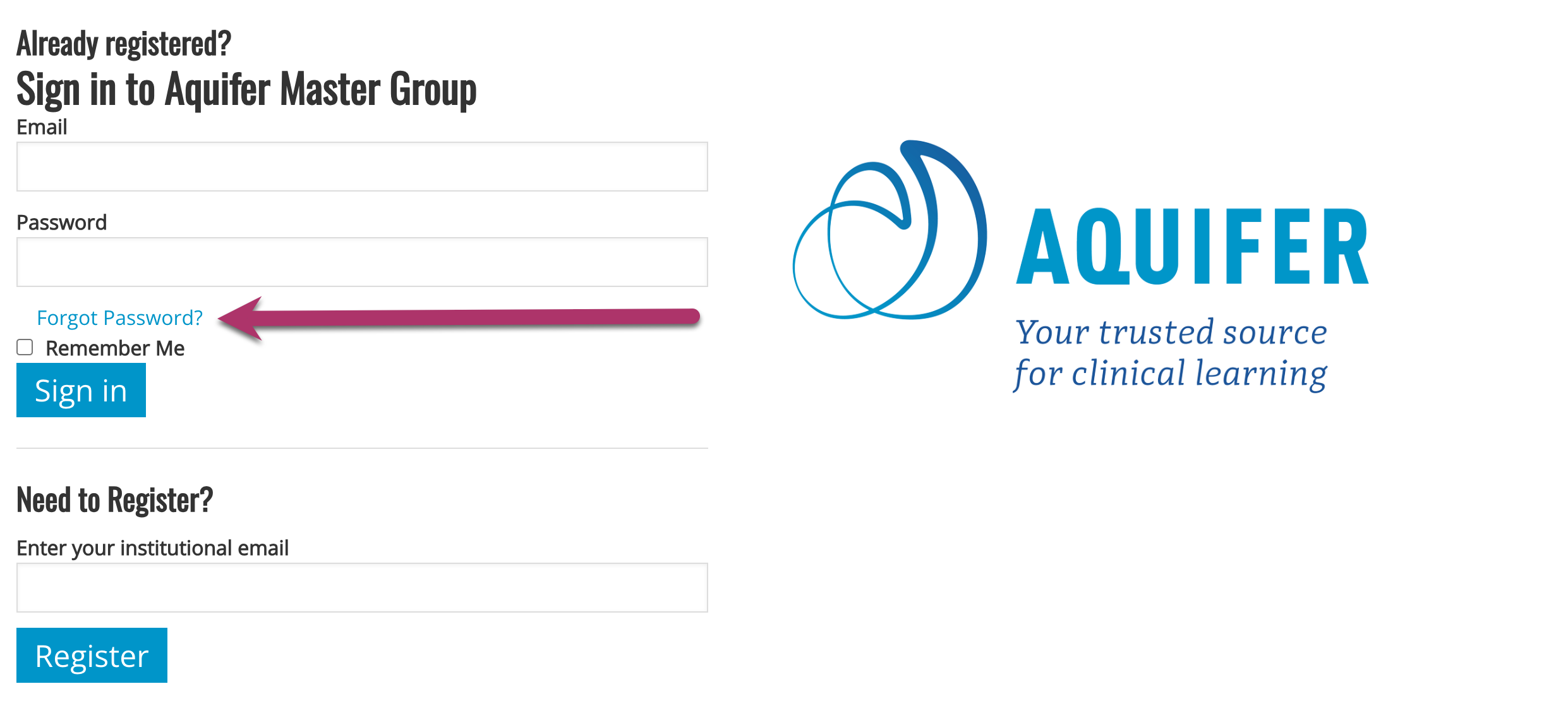
2. You will be brought to a page where you can enter your Account email address. After entering your email address, click “Send me instructions to set my password“.

3. You will receive an email with instructions to reset your password. If you do not see this email, check your spam mailbox. Follow the instructions in the email to reset your password. Click the link to reset your password.
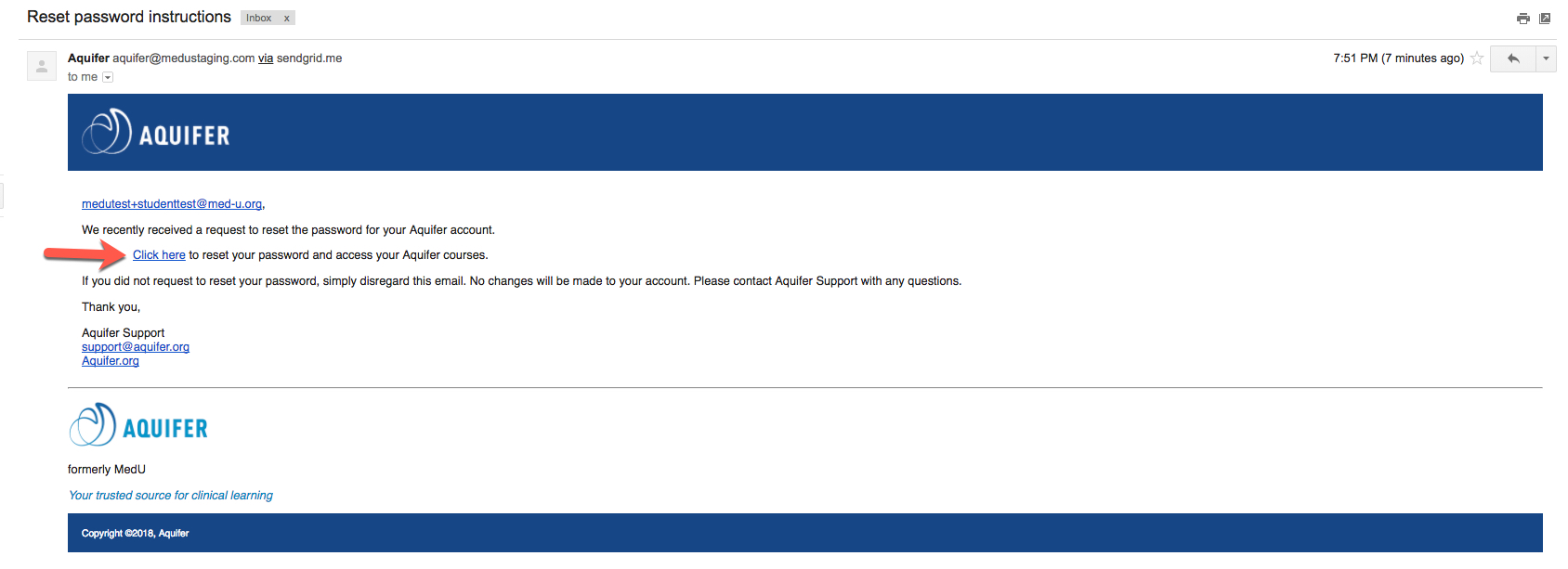
4. You will then be brought to a page where you can reset your password. Please put in your new password twice to confirm and click on “Change my password”. You will then be logged in with your new password.

1. Go to Aquifer.org and click the Sign In button.

2. You will be brought to the Aqueduct Sign In page. Put in your account email address and password. Then click Sign In.

3. On the home screen, you can click the buttons in the top right-hand corner.

View details on Reporting for Students.
Cases are complete when you click the Finish Case button in the Case Summary Download section at the end of each case. Completed cases show on all reporting as a green circle with a check mark.
If you have completed the case content but don’t see the Finish Case button, be sure to complete all three required feedback questions at the end of the case. After you have completed the three feedback questions, you can access the Finish Case button and the downloadable case summary.
If you do not complete the feedback questions and click the Finish Case button, your work will show as partially completed—as a yellow circle showing the percentage complete—on Aquifer reporting for both you and your instructor.
We hope that all learners will share their honest feedback. We will review this feedback and use it to help ensure that we are offering the best possible learning materials.
We are pleased to announce that as of January 29, 2018, MedU has changed its name to Aquifer! When MedU was founded back in 2006, our focus was on providing innovative online learning for third-year medical students during their pediatric clerkship. Over the past ten years, we have grown to be so much more. As Aquifer—your trusted source for clinical learning—we can better reflect who we are today, what we do, and our vision for the future.
Our new name provides an opportunity for more clarity and growth. Simplified course names will link the Aquifer brand to the quality content we provide—building better recognition and trust across our course offerings. The Aquifer brand allows us to be more inclusive of all healthcare professional learners, like Physician Assistants and Nurse Practitioners, who are so critical to health care delivery today. Our new learning management system, launched in July, continues to underlie all our courses, raising the level of your students’ skills and knowledge and delivering learning wherever and whenever it’s needed.
We’re still the same unique non-profit organization led by Aquifer’s academic consortium, dedicated to partnering with national organizations to deliver trusted content—written by educators, for educators—that is evidence-based, peer-reviewed, and continuously updated to support best practices in clinical education.
Our courses and user data remain untouched, providing the same great content, continuously updated by our consortium of medical educators. User reports, rosters, and custom courses remain unchanged. Direct links to our learning management system, including your program-specific URL, will not change.
Please feel free to contact us if you have any questions or concerns about our new brand.
Thank you for flowing along with us!
For Aquifer Pediatrics – Aquifer Family Medicine – Aquifer Radiology Exams
Student results are sent to the clerkship within two business days. Aquifer does not share results directly with students.
Often students will attempt to log back into the exam platform after their administration is over. If a student is “stuck” at the login page, they will need to perform a hard reset of their device in order to return their device to off the Secure Browser. They can be instructed to do a hard reset, or they can be referred to call the helpline.
Aquifer sends two reports with students results from their exams. One is the Administrator’s report, and the other is the Student’s report. For those institutions that desire to give individual reports to students there are a few ways to do so:
For further assistance, please call the Helpline weekdays Mon-Fri 8am to 5pm Eastern Standard Time, except on federal holidays at (603) 727-7002 x2 or email at exams@aquifer.org. If you receive a voicemail, please leave a name and number, someone will return your call as soon as possible.

It’s fast and easy to view your progress through Aquifer content. From your course page, students see a progress bar showing their progress through each case or Integrated Illness Script in the course, and the date the content was last accessed.
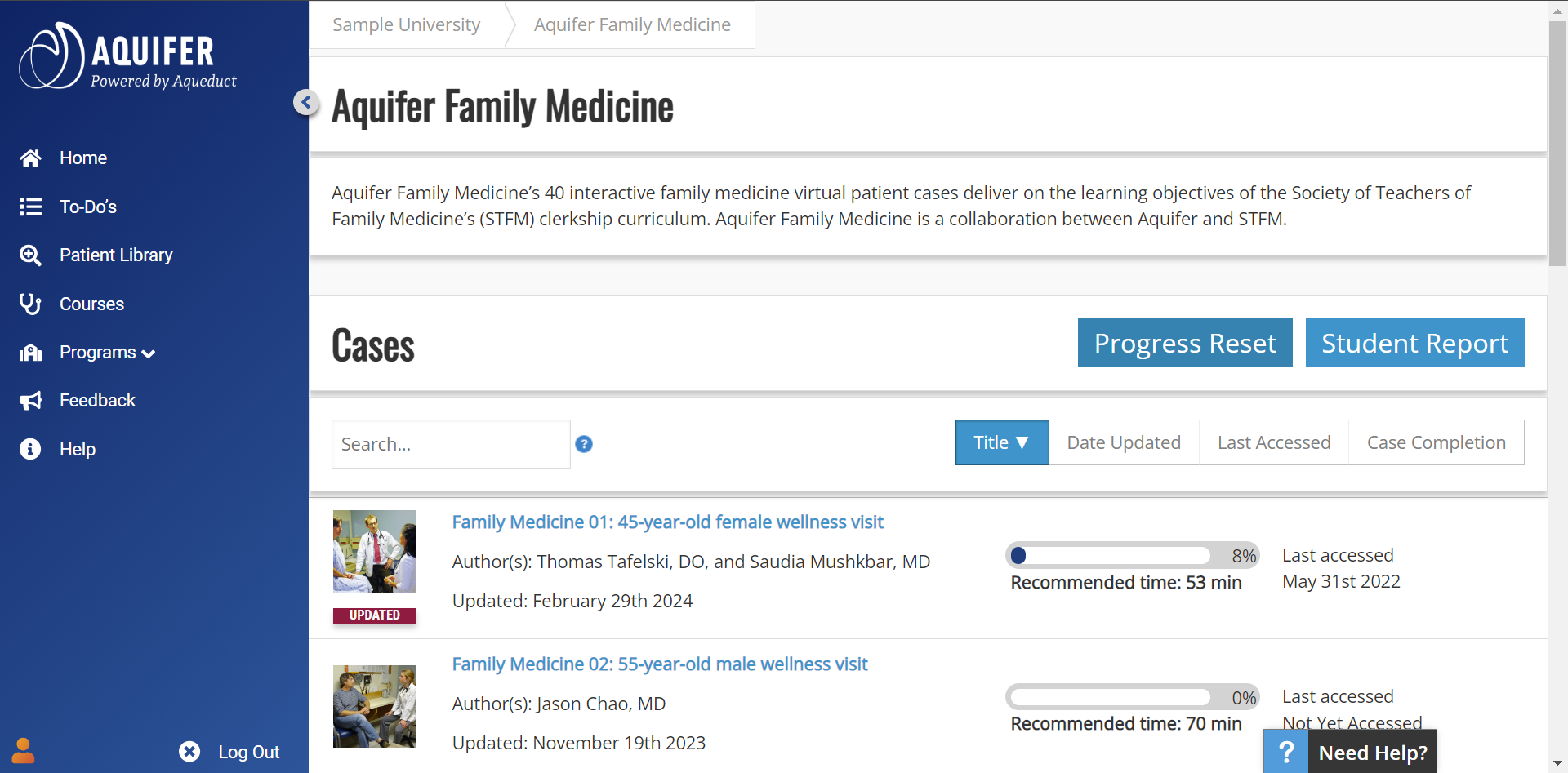
For more detailed information—or to download and save your progress—we recommend using the Student Report for each course. The Student Report for a case includes the following information:
If your program has access to our Integrated Illness Scripts, you will also able to view your progress through scripts in their Student Report. The report will provide the following information:
It’s easy to generate a student report in Aqueduct from your course page:
1. Click on the Courses tab

2. Select the course for which you need the report (e.g., Aquifer Family Medicine)
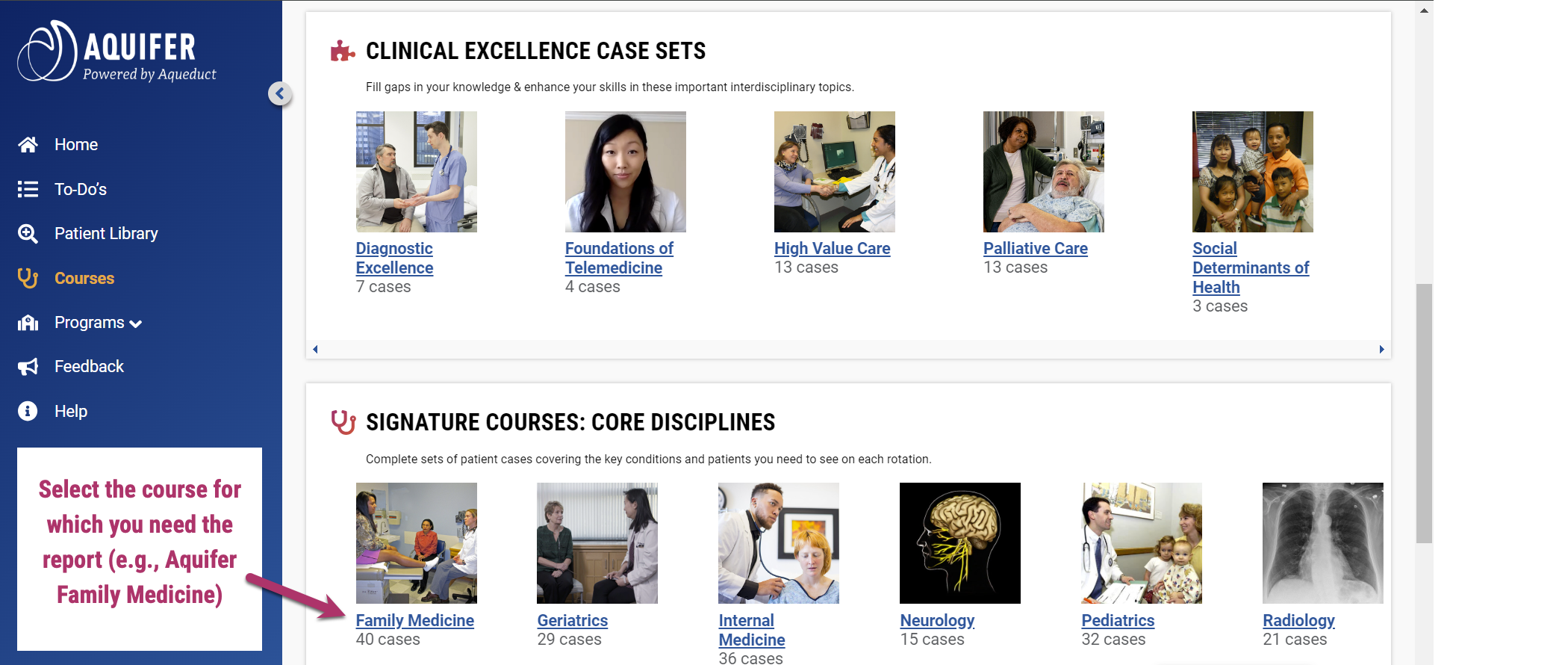
3. Choose the Student Report button on the right-hand side.

4. The generated report will appear. If both cases and scripts are included in a course there will be a separate tab in the report for each.
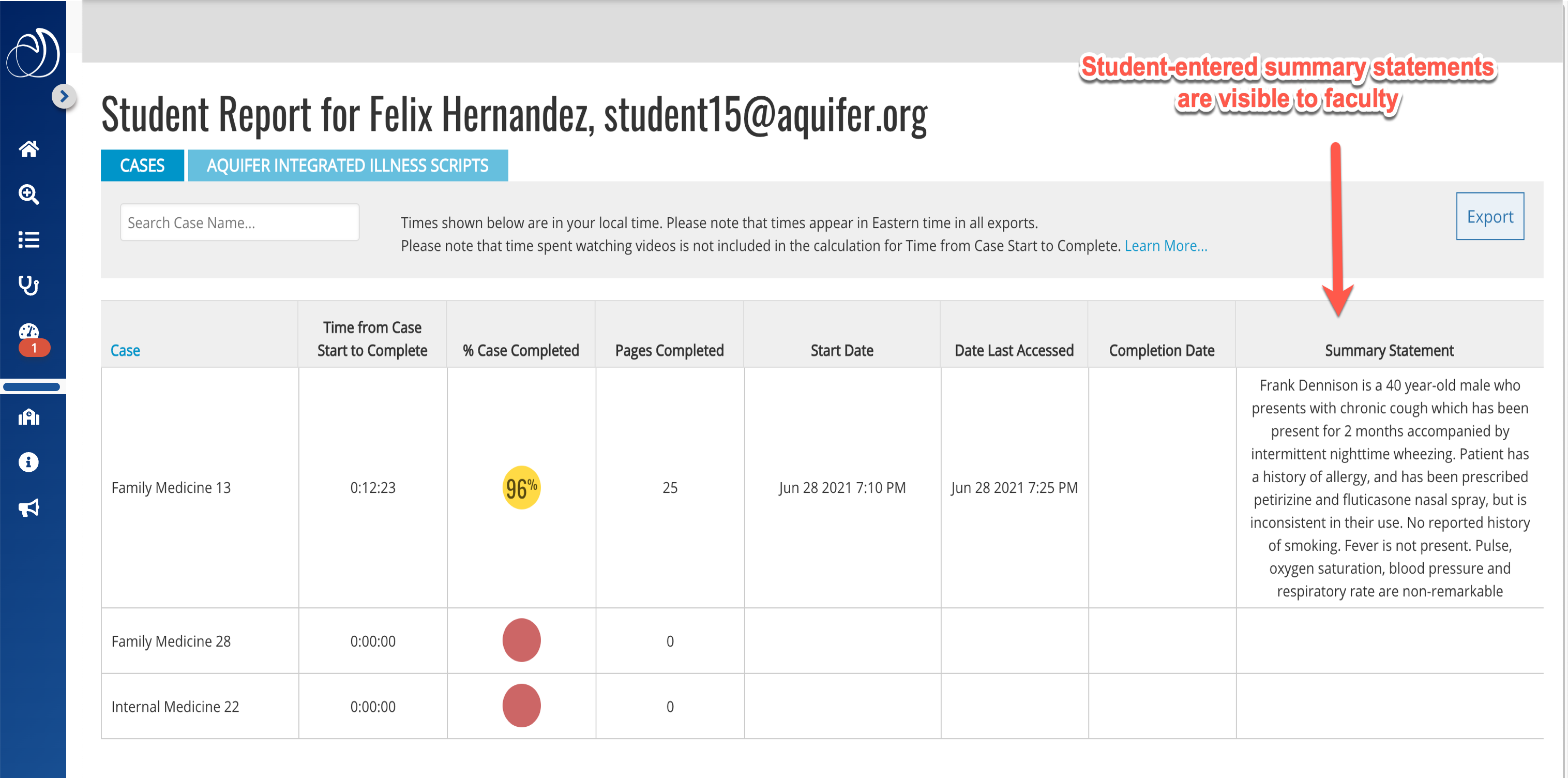

Your progress through a case is shown in real-time as:
You Can Export a CSV File: All reports can be exported to a CSV file, which will allow you to sort and save your course progress including the work done in both cases and scripts. The export button is located on the right-hand side of all reports pages. All times will appear in Eastern Time on exports. Please note that times appear in local time on-screen.
Export Notes:
Cases are complete when you click the Finish Case button in the Case Summary Download section at the end of each case. If you have completed the case content but don’t see the Finish Case button, be sure to answer all three required feedback questions at the end of the case. After you have completed the three feedback questions, you can access the Finish Case button and the downloadable case summary. If you do not complete the feedback questions and click the Finish Case button, your work will show as partially completed—as a yellow circle showing the percentage complete—on Aquifer reporting for both you and your instructor.
Integrated Illness Scripts are marked as complete when you have opened and viewed each section of the script. Opening the Mechanism of Disease Map is reported in a separate column in your report.
Current Password Policy –
Passwords must be at least 12 characters long ✅
Passwords must contain at least one uppercase alpha character (A-Z) ✅
Passwords must contain at least one lowercase alpha character (a-z) ✅
Passwords must contain at least one number. ✅
Passwords may not contain part of the username, first name, last name ✅
Passwords must be changed at least every 180 days ✅
Users may not reuse passwords ✅
Accounts are locked after 5 failed login attempts ✅
1. If you forget your password, Aquifer can help you regain access to your courses and information right away. From the Sign In page, click the Forgot Password link.

2. You will be brought to a page where you can enter your Account email address. After entering your email address, click “Send me instructions to set my password“.

3. You will receive an email with instructions to reset your password. If you do not see this email, check your spam mailbox. Follow the instructions in the email to reset your password. Click the link to reset your password.

4. You will then be brought to a page where you can reset your password. Please put in your new password twice to confirm and click on “Change my password”. You will then be logged in with your new password.
